-
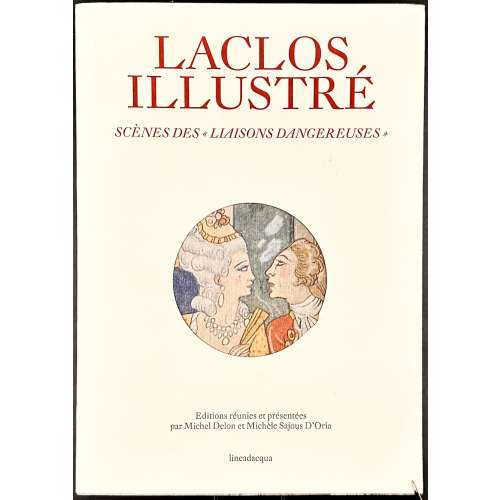 NEWSoftcover, 240 x 170 mm, creme dust jacket with red and black lettering and circular opening in the middle to front, red lettering to spine, over pictorial wrappers, pp. [1-8] 9-143 [1], ISBN 978-88-95598-25-3. 1st edition. Title-page (red and black): LACLOS | ILLUSTRE | « SCÈNES DES « LIAISONS DANGEREUSES» | Editions réunies et présentées | par Michel Delon et Michèle Sajous D'Oria | lineadacqua || Colophon: Imprimé à Venise, Italie | En février 2014 | Par Grafiche Veneziane || Publisher: Lineadacqua Edizioni; San Marco 3717/d, 30124 Venezia; www.lineadacqua.com Contributors: Michel Delon (French, b. 1947) – author Michèl Sajous D’Oria – author Contents: ILLUSTRATION ET INTERPRÉTATION – Michel Delon METTRE LES LETTRES ENSCÈNES – Michèle Sajous D'Oria LES LETTRES L'ÉCRITURE LE SECRET LA TRAHISON LE REFUS LA MARQUISE DE MERTEUIL LA PETITE MAISON LE CHEVALIER DE PRÉVAN LE RIVAL LE PIÈGE LE VICOMTE, DE VALMONT SÉDUCTIONS CÉCILE DE VOLANGES LA SURPRISE DES SENS LE VIOL LAPRÉSIDENTE DE TOURVEL L'AMOUR LA MORT FINALE Bibliographie des éditions illustrées Notices sur les illustrateurs
NEWSoftcover, 240 x 170 mm, creme dust jacket with red and black lettering and circular opening in the middle to front, red lettering to spine, over pictorial wrappers, pp. [1-8] 9-143 [1], ISBN 978-88-95598-25-3. 1st edition. Title-page (red and black): LACLOS | ILLUSTRE | « SCÈNES DES « LIAISONS DANGEREUSES» | Editions réunies et présentées | par Michel Delon et Michèle Sajous D'Oria | lineadacqua || Colophon: Imprimé à Venise, Italie | En février 2014 | Par Grafiche Veneziane || Publisher: Lineadacqua Edizioni; San Marco 3717/d, 30124 Venezia; www.lineadacqua.com Contributors: Michel Delon (French, b. 1947) – author Michèl Sajous D’Oria – author Contents: ILLUSTRATION ET INTERPRÉTATION – Michel Delon METTRE LES LETTRES ENSCÈNES – Michèle Sajous D'Oria LES LETTRES L'ÉCRITURE LE SECRET LA TRAHISON LE REFUS LA MARQUISE DE MERTEUIL LA PETITE MAISON LE CHEVALIER DE PRÉVAN LE RIVAL LE PIÈGE LE VICOMTE, DE VALMONT SÉDUCTIONS CÉCILE DE VOLANGES LA SURPRISE DES SENS LE VIOL LAPRÉSIDENTE DE TOURVEL L'AMOUR LA MORT FINALE Bibliographie des éditions illustrées Notices sur les illustrateurs -
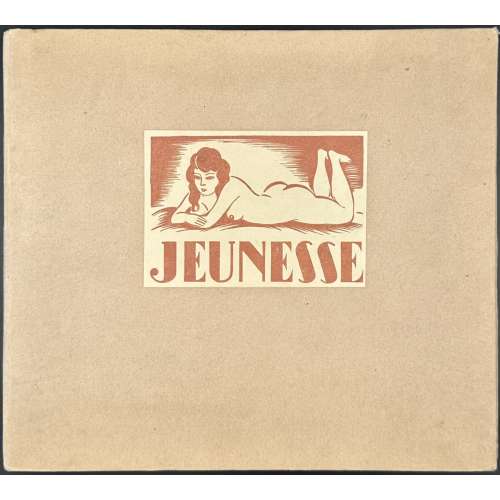 NEWCardboard folder with title label to front, 23.5 x 26.3 cm, containing 12 hand-coloured soft-ground etchings by André Collot, unbound, in a paper folder with pink lettering and vignette engraved on wood, with a title-page in black: JEUNESSE | 12 VERNIS MOUS COLORIÉS | tires à exemplaires | réservés aux Amis de l’Artiste | 1933 || in a frame. First edition, limited to 60 copies. Dutel 1920-70: 1786. There is another copy of the same without the cardboard folder SVE-0469.2021.
NEWCardboard folder with title label to front, 23.5 x 26.3 cm, containing 12 hand-coloured soft-ground etchings by André Collot, unbound, in a paper folder with pink lettering and vignette engraved on wood, with a title-page in black: JEUNESSE | 12 VERNIS MOUS COLORIÉS | tires à exemplaires | réservés aux Amis de l’Artiste | 1933 || in a frame. First edition, limited to 60 copies. Dutel 1920-70: 1786. There is another copy of the same without the cardboard folder SVE-0469.2021. -
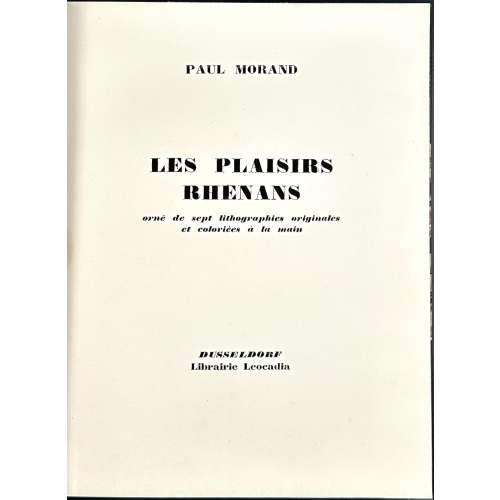 NEWHardcover, 255 x 200 mm, ¾ green morocco over marbled boards, gilt lettering to spine with raised bands, grey laid paper endpapers, Serge Golifman’s bookplate pasted to verso, 3 ffl, orig. wrappers, incl spine, preserved; collated: 2 blanks, h.t., t.p., 14 leaves of text; faux t.p. Éloge de la marquise de Beausemblant, 6 leaves of text, colophon (limitation), 2 blanks, 3 ffl, unpaginated, plus 7 leaves of plates, incl. frontispiece. Publisher's wrappers 250 x 190 mm. Title-page (red and black): PAUL MORAND | LES PLAISIRS | RHENANS | orné de sept lithographies originales | et coloriées à la main | DUSSELDORF | Librairie Leocadia || The front wrapper is the same, in black only. Limitation: Cette édition, imprimée pour une Société de Bibliophiles, a été tirée à 107 exemplaires hors commerce, savoir: exemplaires sur vieux japon, numérotés de 1 à 7, et 100 exemplaires sur vélin d'Arches, numérotés de 8 à 107. Les lithographies ont été tirées sur presse à bras et coloriées à la main. Les pierres ont été poncées après tirage. Exemplaire N° 81. [The edition was printed for a bibliophile society in 107 non-commercial copies: 7 copies on “vieux Japon” paper, numbered from 1 to 7, and 100 copies on “Arches Vellum”, numbered from 8 to 107, of which this is copy № 81]. An unauthorized (pirated) edition of two short stories by Paul Morand, initially published in “L’Europe galante” by Éditions Grasset in 1925: Les plaisirs rhénans and Éloge de la marquise de Beausemblant; illustrated with 7 lithographs coloured with crayons after Gaston-Louis Roux, printed by Mme Duchatel; the stones were then destroyed (sanded). According to Pia: « Pour le principe, semble-t-il, Bernard Grasset à qui aucune autorisation d’éditer ainsi ces deux nouvelles n'avait été demandée, déposa une plainte contre X... en contrefaçon. L'enquête judiciaire, si enquête il y eut, n’aboutit pas. Le tirage de l’édition « pirate » avait été si restreint que tous les exemplaires en avaient été vendus sitôt parus. Le coupable, en l’occurrence René Bonnel, ne fut pas inquiété ». Dutel attests: « Un des personnages, subissant une agréable fellation, représenté sur l'une des lithographies, ressemble fort à Paul Morand qui en avait pris ombrage! » Comment by the seller: L’ouvrage est d’autant plus rare que Morand lui-même, mécontent d’une des gravures qui le représente en position intéressante, fit détruire une partie des exemplaires. Resume: While Bernard Grasset opposed the pirated edition on copyright infringement grounds, Paul Morand was enraged by his resemblance to the depicted character; the latter destroyed as many copies of the edition as he could, so only a few still exist. The print run of the "pirate" edition was so limited that all the copies were sold as soon as they were published. Catalogue Raisonné: Dutel III № 2215 (p. 321) ; Pia : № 1056; Nordmann (I) № 281. Contributors: Paul Morand (French, 1888 – 1976) – author Gaston-Louis Roux (French, 1904 – 1988) – artist René Bonnel (French, 18841 – 1975) – publisher Bernard Grasset (French, 1881 – 1955) – publisher
NEWHardcover, 255 x 200 mm, ¾ green morocco over marbled boards, gilt lettering to spine with raised bands, grey laid paper endpapers, Serge Golifman’s bookplate pasted to verso, 3 ffl, orig. wrappers, incl spine, preserved; collated: 2 blanks, h.t., t.p., 14 leaves of text; faux t.p. Éloge de la marquise de Beausemblant, 6 leaves of text, colophon (limitation), 2 blanks, 3 ffl, unpaginated, plus 7 leaves of plates, incl. frontispiece. Publisher's wrappers 250 x 190 mm. Title-page (red and black): PAUL MORAND | LES PLAISIRS | RHENANS | orné de sept lithographies originales | et coloriées à la main | DUSSELDORF | Librairie Leocadia || The front wrapper is the same, in black only. Limitation: Cette édition, imprimée pour une Société de Bibliophiles, a été tirée à 107 exemplaires hors commerce, savoir: exemplaires sur vieux japon, numérotés de 1 à 7, et 100 exemplaires sur vélin d'Arches, numérotés de 8 à 107. Les lithographies ont été tirées sur presse à bras et coloriées à la main. Les pierres ont été poncées après tirage. Exemplaire N° 81. [The edition was printed for a bibliophile society in 107 non-commercial copies: 7 copies on “vieux Japon” paper, numbered from 1 to 7, and 100 copies on “Arches Vellum”, numbered from 8 to 107, of which this is copy № 81]. An unauthorized (pirated) edition of two short stories by Paul Morand, initially published in “L’Europe galante” by Éditions Grasset in 1925: Les plaisirs rhénans and Éloge de la marquise de Beausemblant; illustrated with 7 lithographs coloured with crayons after Gaston-Louis Roux, printed by Mme Duchatel; the stones were then destroyed (sanded). According to Pia: « Pour le principe, semble-t-il, Bernard Grasset à qui aucune autorisation d’éditer ainsi ces deux nouvelles n'avait été demandée, déposa une plainte contre X... en contrefaçon. L'enquête judiciaire, si enquête il y eut, n’aboutit pas. Le tirage de l’édition « pirate » avait été si restreint que tous les exemplaires en avaient été vendus sitôt parus. Le coupable, en l’occurrence René Bonnel, ne fut pas inquiété ». Dutel attests: « Un des personnages, subissant une agréable fellation, représenté sur l'une des lithographies, ressemble fort à Paul Morand qui en avait pris ombrage! » Comment by the seller: L’ouvrage est d’autant plus rare que Morand lui-même, mécontent d’une des gravures qui le représente en position intéressante, fit détruire une partie des exemplaires. Resume: While Bernard Grasset opposed the pirated edition on copyright infringement grounds, Paul Morand was enraged by his resemblance to the depicted character; the latter destroyed as many copies of the edition as he could, so only a few still exist. The print run of the "pirate" edition was so limited that all the copies were sold as soon as they were published. Catalogue Raisonné: Dutel III № 2215 (p. 321) ; Pia : № 1056; Nordmann (I) № 281. Contributors: Paul Morand (French, 1888 – 1976) – author Gaston-Louis Roux (French, 1904 – 1988) – artist René Bonnel (French, 18841 – 1975) – publisher Bernard Grasset (French, 1881 – 1955) – publisher -
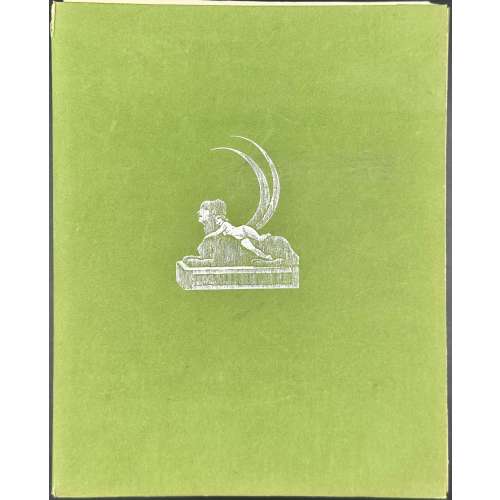 NEWSoftcover, 240 x 190 mm, green velvet paper French flapped wrappers with a silver vignette of Rops’ sphynx, in half of double-slipcase, pp. [1-8] 9-76 [8], i.e. 42 leaves plus 20 hand-coloured soft-ground etchings, incl. frontispiece, attributed to Louis Berthomme Saint-André. Text and plates printed on thick wove paper watermarked Arches, margines untrimmed; anonymous woodcut head- and tailpieces. Enhanced by a complete set of plates, uncoloured, in green velvet paper folder, gilt inside. Pibrac (or Pybrac) by Pierre Louÿs is "composed of 313 rhymed Alexandrine quatrains, the majority of them starting with the phrase I do not like to see. Pybrac is in the form a mockery of sixteenth-century chancellor poet Guy Du Faur, seigneur de Pibrac (French, 1528-1584), whose moralizing quatrains were the common literary fare for young French readers until the nineteenth century".
NEWSoftcover, 240 x 190 mm, green velvet paper French flapped wrappers with a silver vignette of Rops’ sphynx, in half of double-slipcase, pp. [1-8] 9-76 [8], i.e. 42 leaves plus 20 hand-coloured soft-ground etchings, incl. frontispiece, attributed to Louis Berthomme Saint-André. Text and plates printed on thick wove paper watermarked Arches, margines untrimmed; anonymous woodcut head- and tailpieces. Enhanced by a complete set of plates, uncoloured, in green velvet paper folder, gilt inside. Pibrac (or Pybrac) by Pierre Louÿs is "composed of 313 rhymed Alexandrine quatrains, the majority of them starting with the phrase I do not like to see. Pybrac is in the form a mockery of sixteenth-century chancellor poet Guy Du Faur, seigneur de Pibrac (French, 1528-1584), whose moralizing quatrains were the common literary fare for young French readers until the nineteenth century".honesterotica.com: Pibrac is best remembered for his own collection of poems, a set of 126 moralistic quatrains, which throughout its endless printings bestowed good advice and guidelines to proper conduct…
The English translation of Louÿs' Pibrac/Pybrac by Geoffrey Longnecker was published by Wakefield Press in 2014: https://wakefieldpress.com/products/pybrac Title-page (green and black): PIBRAC | QUATRAINS ÉROTIQUES | DE | PIERRE LOUYS | {vignette} | AUX DÉPENS D’UN AMATEUR | POUR LE PROFIT DE QUELQUES AUTRES | M. IM. XXXIII || Imprint / Limitation: Cette édition des quatrains érotiques de Pierre Louÿs, illustrée de vingt eaux-fortes originales d'un artiste inconnu, a été strictement limitée à 300 exemplaires qui ont été composés en Elzévir vieux style de corps 12 avec des caractères neufs. Ils ont tous été tirés sur grand vélin d'Arches à la forme et comportent tous un état avec remarque des 20 planches, tiré en noir. Justification du tirage: 20 exemplaires sur grand vélin d'Arches à la forme, numérotés de 1 à 20, auxquels il a été ajouté en plus des états avec remarque des 20 cuivres, 1 des aquarelles ayant servi à l'illustration, 1 croquis original et 1 cuivre encré. 280 exemplaires sur grand vélin d'Arches à la forme, numérotés de 21 à 300, comprenant tous les états avec remarque. Il a été tiré en outre 8 exemplaires sur Arches, numérotés en chiffres romains de I à VIII, destinés aux collaborateurs de l'ouvrage. Pour authentifier la présente édition, l'artiste et l'éditeur apposeront sur cette justification un cachet en garantissant l'originalité. Cet exemplaire porte le No 290. Colophon: La présente édition a été achevée d'imprimer à Paris le trente et un janvier mil neuf cent trente-quatre par deux imprimeurs amis des belles éditions. Catalogue raisonné: Dutel III № 2198. Collaborators: Pierre Louÿs (French, 1870 – 1925) – author. Louis Berthomme Saint-André (French, 1905 – 1977) – artist. Edition attributed to the bookseller Robert Télin. -
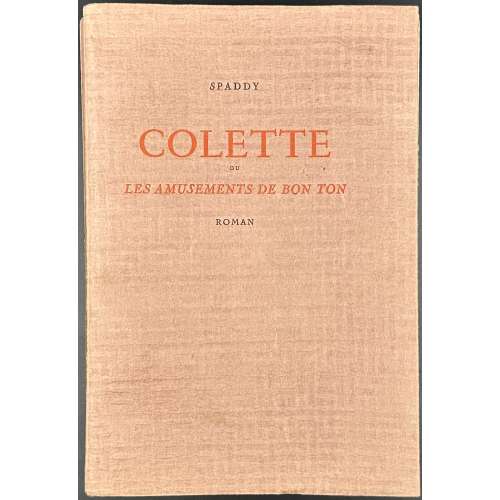 NEWSoftcover, 228 x 155 mm, embossed geometrical diaper pink French flapped wrappers with black and orange lettering to front; collated 8vo: 1-108, i.e. 80 leaves, pp.: [4] [1-4] 5-152 [4], plus 12 colour plates; woodcut t.p. vignette, head- and tailpieces in sanguine. Text printed on wove paper watermarked Marais, untrimmed, some leaves uncut; colour illustrations produced by half-tone relief photo reproduction technique and printed on thinner paper without a watermark. Colouring is most probably made by hand. Besides the presence of the platemarks, micro-photo reveals clear signs of the half-tone relief photomechanical reproduction method:
NEWSoftcover, 228 x 155 mm, embossed geometrical diaper pink French flapped wrappers with black and orange lettering to front; collated 8vo: 1-108, i.e. 80 leaves, pp.: [4] [1-4] 5-152 [4], plus 12 colour plates; woodcut t.p. vignette, head- and tailpieces in sanguine. Text printed on wove paper watermarked Marais, untrimmed, some leaves uncut; colour illustrations produced by half-tone relief photo reproduction technique and printed on thinner paper without a watermark. Colouring is most probably made by hand. Besides the presence of the platemarks, micro-photo reveals clear signs of the half-tone relief photomechanical reproduction method: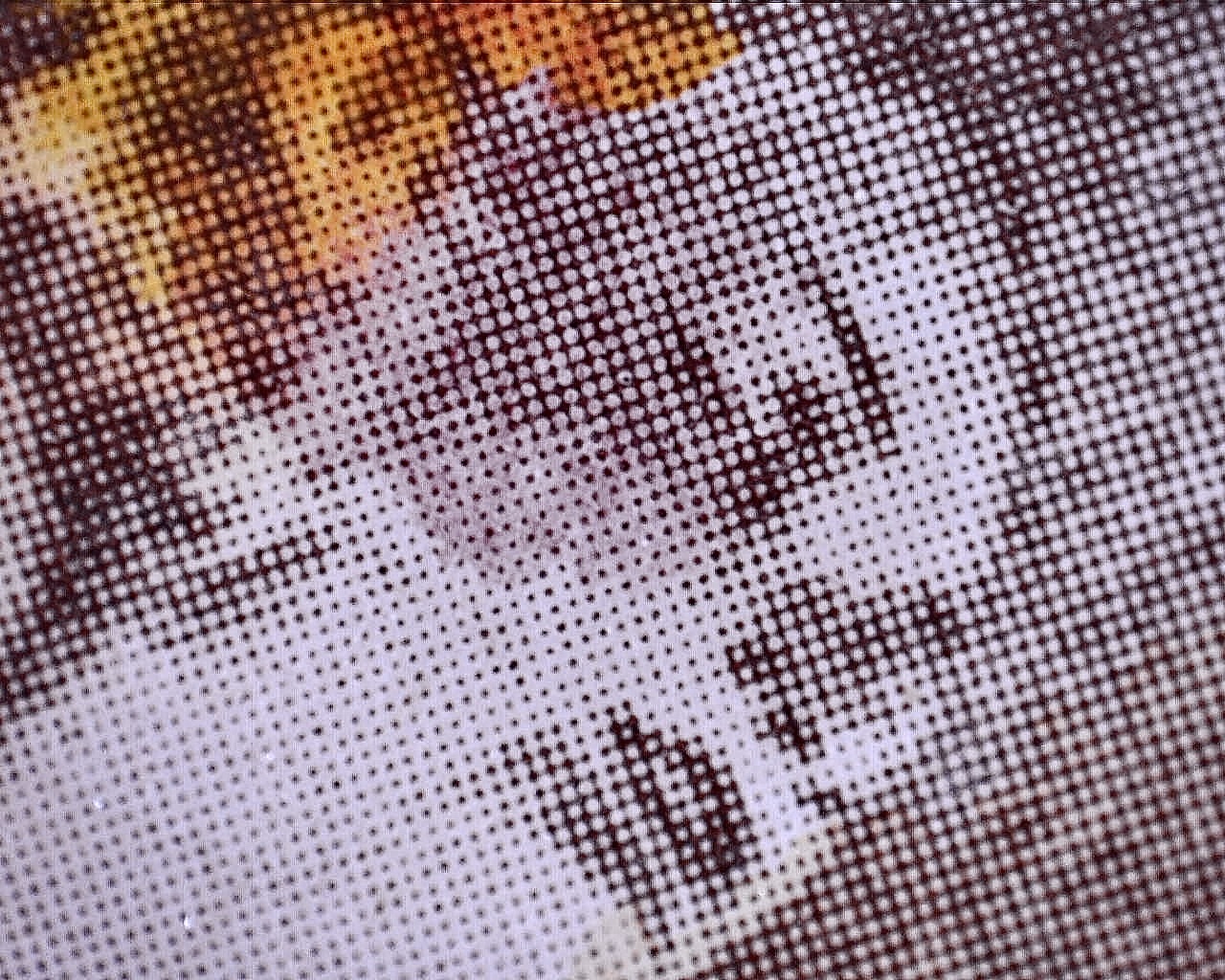 Title-page (red and black): SPADDY | COLETTE | OU | LES AMUSEMENTS DE BON TON | ROMAN | {vignette} | A SAINT – CLOUD | AU TEMPLE DE CYTHÈRE ||
Limitation: CE ROMAN, EDITÉ POUR DES AMATEURS ET | NON MIS DANS LE COMMERCE, A ETÉ TIRÉ | A 250 EXEMPLAIRES, SUR VELIN PUR FIL | DU MARAIS, NUMÉROTÉS A LA PRESSE. | Cet exemplaire porte le No 49
Catalogue Raisonné: Dutel III № 1254: second edition with reproduction plates, published in 1939. The 1st edition with the original plates after Bécat was published in c. 1938.
Honesterotica.com:
Title-page (red and black): SPADDY | COLETTE | OU | LES AMUSEMENTS DE BON TON | ROMAN | {vignette} | A SAINT – CLOUD | AU TEMPLE DE CYTHÈRE ||
Limitation: CE ROMAN, EDITÉ POUR DES AMATEURS ET | NON MIS DANS LE COMMERCE, A ETÉ TIRÉ | A 250 EXEMPLAIRES, SUR VELIN PUR FIL | DU MARAIS, NUMÉROTÉS A LA PRESSE. | Cet exemplaire porte le No 49
Catalogue Raisonné: Dutel III № 1254: second edition with reproduction plates, published in 1939. The 1st edition with the original plates after Bécat was published in c. 1938.
Honesterotica.com:
Colette, ou les amusements de bon ton (Colette, Good Time Amusements) was an important early commission from Bécat by the master clandestine publisher Maurice Duflou, to complement a text bordering on the outrageous by Johannès Gros…
Contributors: Spaddy [Johannès Gros] (French, 18.. – 1937) – author Maurice Duflou (French, 1885 – 1947) – publisher Paul-Émile Bécat (French, 1885 – 1960) – artist -
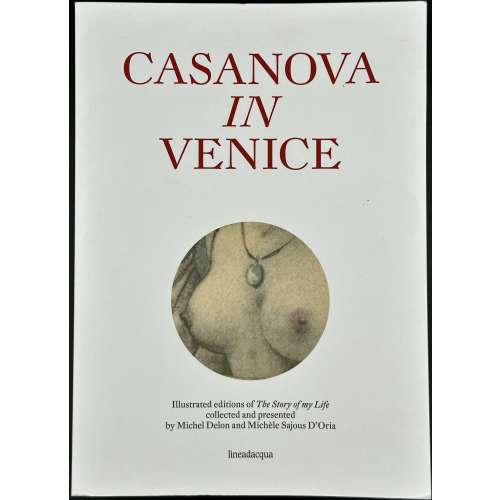 NEWSoftcover, 210 x 149 mm, white wrappers with red and black lettering and a vignette to front, red and black lettering to spine and black lettering to back; pp. [1-8] 9-143 [1]. ISBN 978-88-95598-98-7. Title-page (red and black): CASANOVA | IN | VENICE | Illustrated editions of The story of my life | collected and presented | by Michel Delon and Michèl Sajous D’Oria | lineadacqua || Colophon: Printed in Venice, Italy | In may 2019 | By Grafiche Veneziane, Venice || Back wrapper: 100 illustrations enrich | Casanova's own telling | of his adventures in Venice || First edition in French: April 2013 First edition in English: March 2019 Contributors: Michel Delon (French, b. 1947) – author Michèl Sajous D’Oria – author Lucian Comoy – translator Contents: A WORLD OFIMAGES – Michel Delon OF PLACES AND BOOKS – Michèle Sajous D'Oria PORTRAITS AND ALLEGORIES NANETTE AND MARTON VEDUTE C.C. A LETTER M.M. RENDEZ-VOUS AND AMBUSH THE CASINO AT THE OPERA AND THE RIDOTTO A MASKED BALL AT THE CONVENT THE QUADRILLE COMPARISON MELANCHOLY TONINE AND BARBERINE MASKS ARREST THE PIOMBI ADIEU VENICE Bibliography of the illustrated editions Notes concerning the illustrators
NEWSoftcover, 210 x 149 mm, white wrappers with red and black lettering and a vignette to front, red and black lettering to spine and black lettering to back; pp. [1-8] 9-143 [1]. ISBN 978-88-95598-98-7. Title-page (red and black): CASANOVA | IN | VENICE | Illustrated editions of The story of my life | collected and presented | by Michel Delon and Michèl Sajous D’Oria | lineadacqua || Colophon: Printed in Venice, Italy | In may 2019 | By Grafiche Veneziane, Venice || Back wrapper: 100 illustrations enrich | Casanova's own telling | of his adventures in Venice || First edition in French: April 2013 First edition in English: March 2019 Contributors: Michel Delon (French, b. 1947) – author Michèl Sajous D’Oria – author Lucian Comoy – translator Contents: A WORLD OFIMAGES – Michel Delon OF PLACES AND BOOKS – Michèle Sajous D'Oria PORTRAITS AND ALLEGORIES NANETTE AND MARTON VEDUTE C.C. A LETTER M.M. RENDEZ-VOUS AND AMBUSH THE CASINO AT THE OPERA AND THE RIDOTTO A MASKED BALL AT THE CONVENT THE QUADRILLE COMPARISON MELANCHOLY TONINE AND BARBERINE MASKS ARREST THE PIOMBI ADIEU VENICE Bibliography of the illustrated editions Notes concerning the illustrators -
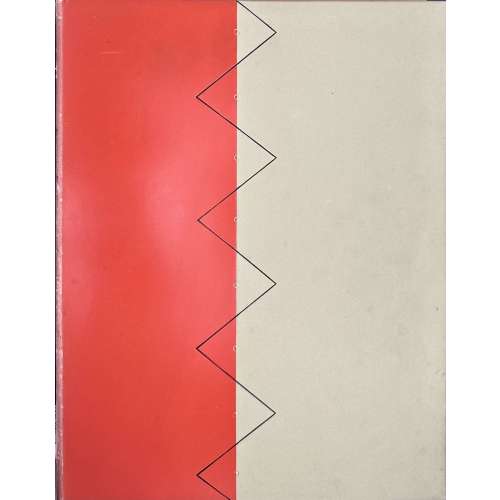 NEWHardcover album 387 x 300 mm, bound in orange half-calf over green paper with vertical black zig-zag and embossed gilt rings, by Isy Brachot of Brussels; includes a photographic portrait of D. H. Lawrence pasted to front green ffl verso, ms title-page, six pages of ms text with a woodcut portrait of the same to page 2, 27 plates (including eight double-page), one blank leaf followed by ten pages of ms text and back green ffl with text to recto, 49 leaves total, plates on thick wove paper, text on Canson & Montgolfier watermarked laid paper, all unpaginated; in a slipcase. The title page indicates: “Vertés, a fashionable and popular designer from 1940 to 1960 […] attempted to illustrate in 1959 the famous novel by D.H. Lawrence, Lady Chatterley's Lover, but not getting along with his publisher, he sold his sketches for two thousand dollars to count Charles de Kerchove de Denterghem (1819 – 1882). Further, the t.p. reads: Les esquisses, lit-on encore sur cette page, furent reliées par Isy Brachot de Bruxelles. Elles furent classées par lui sans ordre, comme elles venaient. En préface figurent un bref résumé du roman, un historique des difficultés qu'il connut, un compte rendu de sa victoire finale. En postface sont transcrits, en langue originale, les scènes illustrées par Vertès dans l'ordre où elles se trouvent écrites, ainsi qu'une appréciation de l'art de Vertès. Michel Vokaer’s Bibliographie de Marcel Vertès (1967) does not mention this collection of sketches; however, it says that the artist had produced two test etchings for Lady Chatterley’s Lover around 1936, which remained unpublished. The gouaches were drawn in the US, and the texts accompanying them are in English, so one could suppose that the prospective publisher—who remains unknown—was American. Contributors: Marcel Vertès [Marcell Vértes] (Jewish-Hungarian-French, 1895 – 1961) David Herbert Lawrence (British, 1885 – 1930)
NEWHardcover album 387 x 300 mm, bound in orange half-calf over green paper with vertical black zig-zag and embossed gilt rings, by Isy Brachot of Brussels; includes a photographic portrait of D. H. Lawrence pasted to front green ffl verso, ms title-page, six pages of ms text with a woodcut portrait of the same to page 2, 27 plates (including eight double-page), one blank leaf followed by ten pages of ms text and back green ffl with text to recto, 49 leaves total, plates on thick wove paper, text on Canson & Montgolfier watermarked laid paper, all unpaginated; in a slipcase. The title page indicates: “Vertés, a fashionable and popular designer from 1940 to 1960 […] attempted to illustrate in 1959 the famous novel by D.H. Lawrence, Lady Chatterley's Lover, but not getting along with his publisher, he sold his sketches for two thousand dollars to count Charles de Kerchove de Denterghem (1819 – 1882). Further, the t.p. reads: Les esquisses, lit-on encore sur cette page, furent reliées par Isy Brachot de Bruxelles. Elles furent classées par lui sans ordre, comme elles venaient. En préface figurent un bref résumé du roman, un historique des difficultés qu'il connut, un compte rendu de sa victoire finale. En postface sont transcrits, en langue originale, les scènes illustrées par Vertès dans l'ordre où elles se trouvent écrites, ainsi qu'une appréciation de l'art de Vertès. Michel Vokaer’s Bibliographie de Marcel Vertès (1967) does not mention this collection of sketches; however, it says that the artist had produced two test etchings for Lady Chatterley’s Lover around 1936, which remained unpublished. The gouaches were drawn in the US, and the texts accompanying them are in English, so one could suppose that the prospective publisher—who remains unknown—was American. Contributors: Marcel Vertès [Marcell Vértes] (Jewish-Hungarian-French, 1895 – 1961) David Herbert Lawrence (British, 1885 – 1930) -
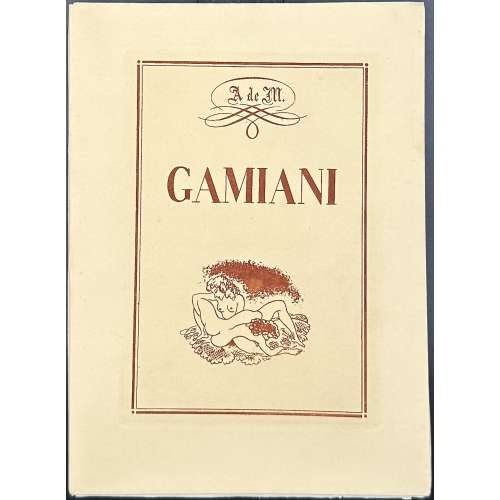 NEWSoftcover volume 200 x 145 mm, in a slipcase, unbound, in French wrappers, sanguine lettering on cream paper, block printed on wove paper with watermark “Marais”, collated 8vo, pp.: [1-6] 7-114 [6], 60 leaves, first and last leaves blank; illustrated with 20 etchings, incl. vignette on front wrapper, two head- and two tailpieces, printed in sanguine; etching on t.p., similar to the one on the front wrapper, printed in black. Limited edition of 250 copies, this is copy № 24. Front wrapper and title-page: in a double frame A de M. | GAMIANI | {vignette} || Colophon: CE LIVRE | IMPRIMÉ AUX DÉPENS | D'UN GROUP D'AMATEURS | SUR PAPIER CHIFFON | A ÉTÉ TIRE | A DEUX CENT CINQUANTE EXEMPLAIRES | LA VENTE AU PUBLIC | EN EST RIGOUREUSEMENT INTERDITE | EXEMPLAIRE N°24 || [This book is printed at the expense of a group of amateurs on rag paper in two hundred and fifty copies; sale to the public is strictly prohibited]. Catalogue raisonné: Dutel III № 1649. Alfred de Musset (French, 1810 – 1857) – author.
NEWSoftcover volume 200 x 145 mm, in a slipcase, unbound, in French wrappers, sanguine lettering on cream paper, block printed on wove paper with watermark “Marais”, collated 8vo, pp.: [1-6] 7-114 [6], 60 leaves, first and last leaves blank; illustrated with 20 etchings, incl. vignette on front wrapper, two head- and two tailpieces, printed in sanguine; etching on t.p., similar to the one on the front wrapper, printed in black. Limited edition of 250 copies, this is copy № 24. Front wrapper and title-page: in a double frame A de M. | GAMIANI | {vignette} || Colophon: CE LIVRE | IMPRIMÉ AUX DÉPENS | D'UN GROUP D'AMATEURS | SUR PAPIER CHIFFON | A ÉTÉ TIRE | A DEUX CENT CINQUANTE EXEMPLAIRES | LA VENTE AU PUBLIC | EN EST RIGOUREUSEMENT INTERDITE | EXEMPLAIRE N°24 || [This book is printed at the expense of a group of amateurs on rag paper in two hundred and fifty copies; sale to the public is strictly prohibited]. Catalogue raisonné: Dutel III № 1649. Alfred de Musset (French, 1810 – 1857) – author. -
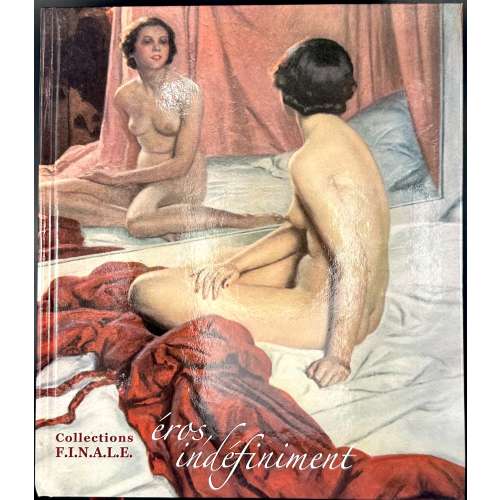 NEWHardcover volume, 297 x 256 x 40 mm, glossy pictorial boards, pp. [1-8] 9-428 [4], profusely illustrated, text in French. F.I.N.A.L.E. stands for Foundation Internationale d’Arts et Litératures Érotiques (Foundation of Erotic Arts and Literatures, established on December 12, 1996 in Lausanne, Switzerland. Title-page: éros, | indéfiniment | Collections F.I.N.A.L.E. | { HumuS, publisher’s device} ||
NEWHardcover volume, 297 x 256 x 40 mm, glossy pictorial boards, pp. [1-8] 9-428 [4], profusely illustrated, text in French. F.I.N.A.L.E. stands for Foundation Internationale d’Arts et Litératures Érotiques (Foundation of Erotic Arts and Literatures, established on December 12, 1996 in Lausanne, Switzerland. Title-page: éros, | indéfiniment | Collections F.I.N.A.L.E. | { HumuS, publisher’s device} || -
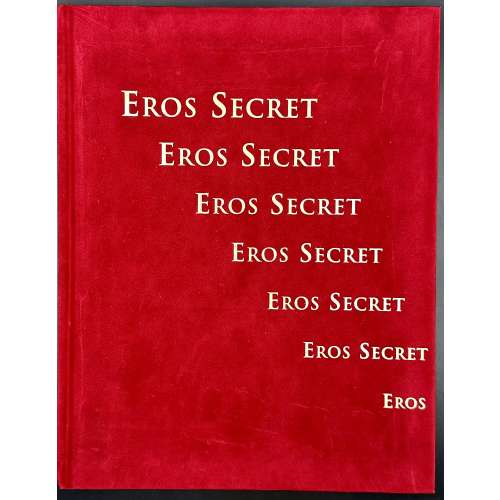 NEWHardcover volume, 290 x 225 mm, bound in scarlet velveteen with gilt lettering to front and spine, gilt vignette and lettering to back; pp.: [1-8] 9-204 [4], profusely illustrated; text in French and English. ISBN : 2-940127-37-9. Title-page (yellow on red paper): EROS SECRET | OBJETS EROTIQUES A TRANSFORMATION | EROTIC TRANSFORMATION OBJECTS | Photographies et chorégraphie : Véronique Willemin | Photographer and choreography || “The ensemble of 150 objects presented belongs to one single collector. The manner in which the author met him at the airport of Larnaca, then on a yacht in the Mediterranean sea, resembles more a novel by Gérard de Villiers than the preface of a curator but has its own touch of spice” [Art of the day Weekly].
NEWHardcover volume, 290 x 225 mm, bound in scarlet velveteen with gilt lettering to front and spine, gilt vignette and lettering to back; pp.: [1-8] 9-204 [4], profusely illustrated; text in French and English. ISBN : 2-940127-37-9. Title-page (yellow on red paper): EROS SECRET | OBJETS EROTIQUES A TRANSFORMATION | EROTIC TRANSFORMATION OBJECTS | Photographies et chorégraphie : Véronique Willemin | Photographer and choreography || “The ensemble of 150 objects presented belongs to one single collector. The manner in which the author met him at the airport of Larnaca, then on a yacht in the Mediterranean sea, resembles more a novel by Gérard de Villiers than the preface of a curator but has its own touch of spice” [Art of the day Weekly]. -
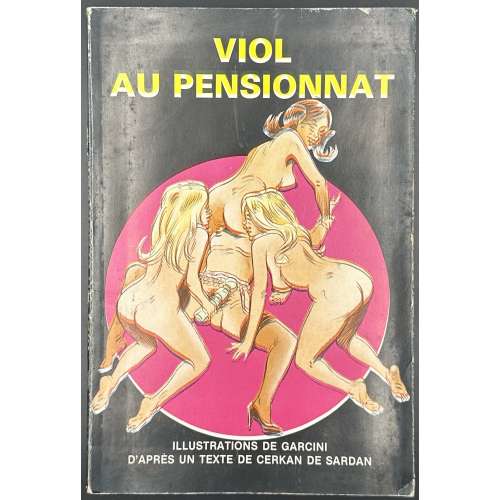 NEWSoftcover, French flapped pictorial wrappers, 240 x 160 mm, translated title: Rape at the boarding school, pp. [1-6] 7-164 [4], 40 black and white illustrations by Garcini. Title-page: D’après un texte de | CERKAN DE SARDAN | VIOL | AU PENSIONNAT | illustrations de | GARCINI ||
NEWSoftcover, French flapped pictorial wrappers, 240 x 160 mm, translated title: Rape at the boarding school, pp. [1-6] 7-164 [4], 40 black and white illustrations by Garcini. Title-page: D’après un texte de | CERKAN DE SARDAN | VIOL | AU PENSIONNAT | illustrations de | GARCINI || -
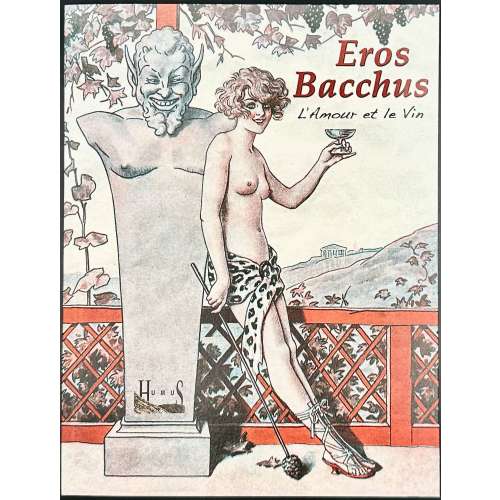 NEWBound in full-colour pictorial wrappers with French flaps, 250 x 190 x 35 mm, 1,311 g by weight, profusely illustrated volume, pp. [1-4] 5-427 [5], 216 leaves total. Title-page: {vignette} | EROS BACCHUS | L'amour et le vin | {publisher's device} || Exhibition at Château Musée du vin et de la vigne, à Aigle, du 24 mai 2014 au 28 février 2015. Text by Michel Froidevaux. Original description : Depuis l'apparition du vignoble, l'amour et le vin sont inséparables. Tantôt boisson des dieux, tantôt breuvage des poètes, le vin a la vertu de rapprocher les êtres. De la riche mythologie antique - Dionysos et Bacchus - aux fêtes des confréries contemporaines, le vin enflamme l'imaginaire et génère de la convivialité. L'idée est de proposer un parcours ludique et culturel, badin et savant pour aller par siècles et contrées à la découverte des plaisirs du boire et des méandres du désir. Livre richement illustré d'un millier d'images (dessins, objets, cartes postales,...) avec la participation d'une quarantaine d'artistes contemporains qui ont créé spécialement une œuvre. Machine translation: Love and wine have been inseparable since the dawn of the vineyard. Sometimes the drink of the gods, sometimes the beverage of poets, wine has the virtue of bringing people together. From the rich mythology of antiquity - Dionysus and Bacchus - to contemporary brotherhood celebrations, wine fires the imagination and generates conviviality. The idea is to offer a playful and cultural journey, both playful and learned, through centuries and lands, to discover the pleasures of drinking and the twists and turns of desire. The book is richly illustrated with some 1,000 images (drawings, objects, postcards, etc.), featuring works by some 40 contemporary artists.
NEWBound in full-colour pictorial wrappers with French flaps, 250 x 190 x 35 mm, 1,311 g by weight, profusely illustrated volume, pp. [1-4] 5-427 [5], 216 leaves total. Title-page: {vignette} | EROS BACCHUS | L'amour et le vin | {publisher's device} || Exhibition at Château Musée du vin et de la vigne, à Aigle, du 24 mai 2014 au 28 février 2015. Text by Michel Froidevaux. Original description : Depuis l'apparition du vignoble, l'amour et le vin sont inséparables. Tantôt boisson des dieux, tantôt breuvage des poètes, le vin a la vertu de rapprocher les êtres. De la riche mythologie antique - Dionysos et Bacchus - aux fêtes des confréries contemporaines, le vin enflamme l'imaginaire et génère de la convivialité. L'idée est de proposer un parcours ludique et culturel, badin et savant pour aller par siècles et contrées à la découverte des plaisirs du boire et des méandres du désir. Livre richement illustré d'un millier d'images (dessins, objets, cartes postales,...) avec la participation d'une quarantaine d'artistes contemporains qui ont créé spécialement une œuvre. Machine translation: Love and wine have been inseparable since the dawn of the vineyard. Sometimes the drink of the gods, sometimes the beverage of poets, wine has the virtue of bringing people together. From the rich mythology of antiquity - Dionysus and Bacchus - to contemporary brotherhood celebrations, wine fires the imagination and generates conviviality. The idea is to offer a playful and cultural journey, both playful and learned, through centuries and lands, to discover the pleasures of drinking and the twists and turns of desire. The book is richly illustrated with some 1,000 images (drawings, objects, postcards, etc.), featuring works by some 40 contemporary artists. -
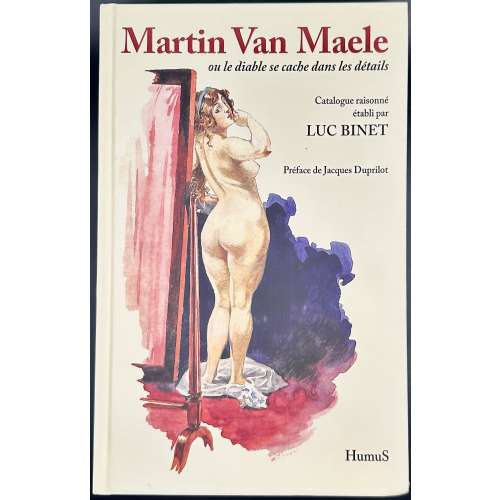 NEWHardcover volume, 292 x 185 x 65 mm, pictorial cream paper over cardboard, black and burgundy lettering to spine and covers; pagination: [4] h.t./imprint, t.p./photo, caption; i-vi, 7-921 [3] colophon; limitation/blank, total 464 leaves. A heavy volume of over 3 kg. Front cover: Martin Van Maele | ou le diable se cache dans détails | Catalogue raisonné | établi par | LUC BINET | Preface de Jacques Duprilot | {vignette} | HumuS || Title-page (red and black): MARTIN VAN MAELE | (1863-1926) | ou le diable se cache dans détails | Catalogue raisonné | établi et commenté par | LUC BINET | Introduction de Jacques Duprilot | {publisher’s device} | ÉDITIONS HUMUS || Edition limited to 333 copies. Maele, Martin van [Martin, Maurice François Alfred] (French, 1863 – 1926)
NEWHardcover volume, 292 x 185 x 65 mm, pictorial cream paper over cardboard, black and burgundy lettering to spine and covers; pagination: [4] h.t./imprint, t.p./photo, caption; i-vi, 7-921 [3] colophon; limitation/blank, total 464 leaves. A heavy volume of over 3 kg. Front cover: Martin Van Maele | ou le diable se cache dans détails | Catalogue raisonné | établi par | LUC BINET | Preface de Jacques Duprilot | {vignette} | HumuS || Title-page (red and black): MARTIN VAN MAELE | (1863-1926) | ou le diable se cache dans détails | Catalogue raisonné | établi et commenté par | LUC BINET | Introduction de Jacques Duprilot | {publisher’s device} | ÉDITIONS HUMUS || Edition limited to 333 copies. Maele, Martin van [Martin, Maurice François Alfred] (French, 1863 – 1926) -
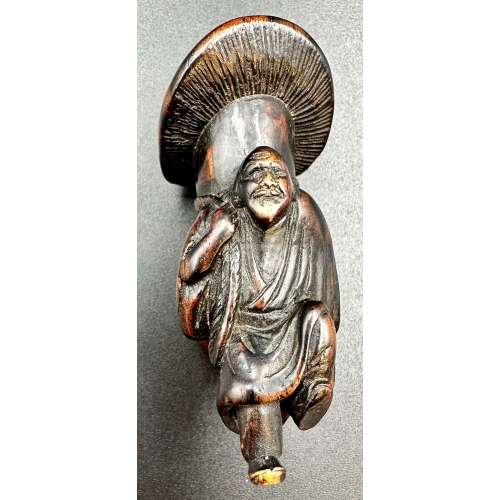 NEW
NEWNetsuke with a design of an old man carrying a giant mushroom on his back. Possibly signed on his left foot. According to Merrily Baird (Symbols of Japan, page. 93): ... This prominent use in the symbol-rich netsuke art form, however, reflects more their sexual symbolism than either their dietary appeal or interesting shapes. Mushrooms in Japan are generally a symbol of fertility, with some flat varieties, like shiitake, being associated with females. In contrast, the matsutake mushroom (Armillaria edodes) is a phallic symbol, as befits its thick, spearlike stem and the fact that it is consumed before cap opens.
Seller's description: "The old man carved walking, with one foot slightly raised, wearing a loose fitted robe and carrying a large long-stemmed mushroom on his back. The wood stained and bearing a fine patina. Himotoshi through the mushroom stem". See VO-0270.2018 for the same subject. Late 18th century. Dimensions: 62 mm tall -
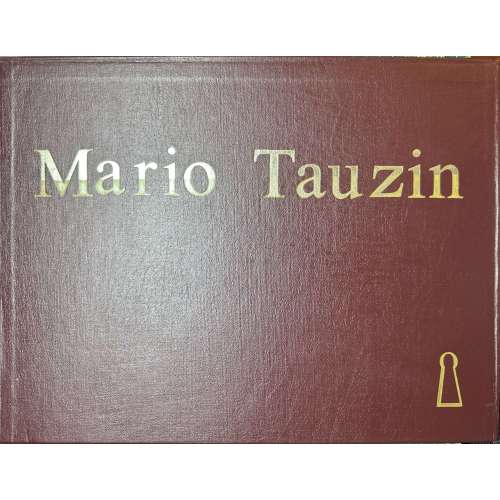 NEWSet of 30 lithographic plates printed on watermarked Van Gelder Simili Japon wove paper, loose in two rexine-backed stiff paper wrappers, 15 in each, together in rexine portfolio with gilt lettering and keyhole on front cover. According to the seller, these are facsimiles of prints/ drawings by Mario Tauzin. Scenes from the series 'Interdit aux adultes'. No publisher indicated; printed in about 1950—a limited edition. Six of these designs used to illustrate 'Bonne à tout faire' were published by Éric Losfeld in the late 1950s (LIB-3293.2024). Dimensions: sheet 320 x 420 mm; album 330 x 430 mm. Contributor: Mario Tauzin (French, 1909 – 1979) — artist
NEWSet of 30 lithographic plates printed on watermarked Van Gelder Simili Japon wove paper, loose in two rexine-backed stiff paper wrappers, 15 in each, together in rexine portfolio with gilt lettering and keyhole on front cover. According to the seller, these are facsimiles of prints/ drawings by Mario Tauzin. Scenes from the series 'Interdit aux adultes'. No publisher indicated; printed in about 1950—a limited edition. Six of these designs used to illustrate 'Bonne à tout faire' were published by Éric Losfeld in the late 1950s (LIB-3293.2024). Dimensions: sheet 320 x 420 mm; album 330 x 430 mm. Contributor: Mario Tauzin (French, 1909 – 1979) — artist -
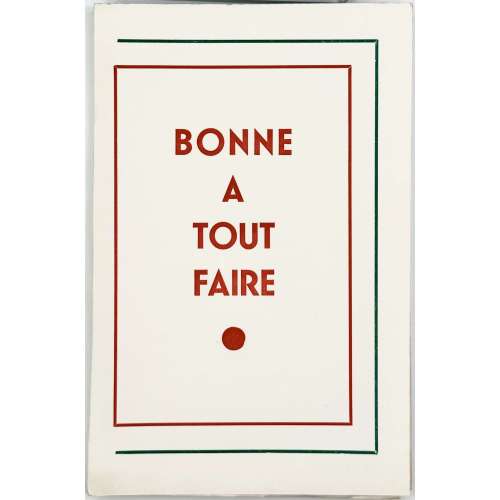 NEWA softcover volume 18.7 x 12.1 cm, in publisher’s cream wrappers, red lettering in red and green frames to front cover, in glassine dustwrapper, uncut, untrimmed, collated in 8vo: 1-98 104, pp. [1-8] 9-151 [152 blank], plus 6 illustrations reproduced in drypoint after Mario Tauzin's lithographs from the album 'Interdit aux adultes' (see SVE-0547.2024). Front cover : BONNE | A | TOUT | FAIRE Title-page : BONNE | A | TOUT | FAIRE Stated limited edition of 900, strictly for subscribers. According to J.-P. Dutel III 1108 (p.66): published by Éric Losfeld in the late 1950s. Bonne à tout faire is a French idiom = maid-of-all-work Éric Losfeld (Belgian-French, 1922 – 1979) — publisher Mario Tauzin (French, 1909 – 1979) — artist
NEWA softcover volume 18.7 x 12.1 cm, in publisher’s cream wrappers, red lettering in red and green frames to front cover, in glassine dustwrapper, uncut, untrimmed, collated in 8vo: 1-98 104, pp. [1-8] 9-151 [152 blank], plus 6 illustrations reproduced in drypoint after Mario Tauzin's lithographs from the album 'Interdit aux adultes' (see SVE-0547.2024). Front cover : BONNE | A | TOUT | FAIRE Title-page : BONNE | A | TOUT | FAIRE Stated limited edition of 900, strictly for subscribers. According to J.-P. Dutel III 1108 (p.66): published by Éric Losfeld in the late 1950s. Bonne à tout faire is a French idiom = maid-of-all-work Éric Losfeld (Belgian-French, 1922 – 1979) — publisher Mario Tauzin (French, 1909 – 1979) — artist -
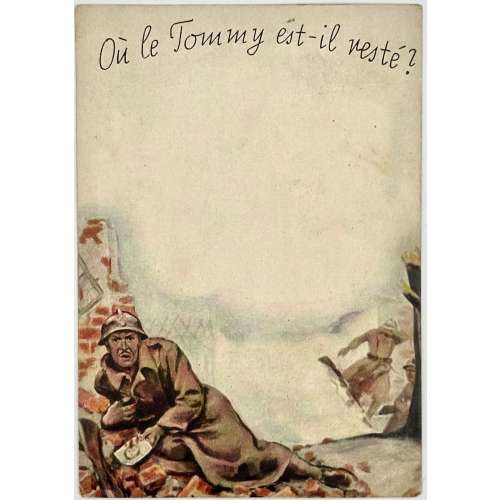 NEWOne of a series of six anti-allies propaganda cards, printed in colour, inscribed Ou le Tommy est-il resté? (Where did Tommy stay?), where Tommy is slang for a common soldier in the British Army. The postcards visibly depict French soldiers who fight and die at the western front, while the covert watermark image shows a British military having fun in a bordello. Those cards were printed in the Third Reich for France and dropped from aeroplanes to motivate French soldiers to fight against the British. Size: 149 x 104 mm
NEWOne of a series of six anti-allies propaganda cards, printed in colour, inscribed Ou le Tommy est-il resté? (Where did Tommy stay?), where Tommy is slang for a common soldier in the British Army. The postcards visibly depict French soldiers who fight and die at the western front, while the covert watermark image shows a British military having fun in a bordello. Those cards were printed in the Third Reich for France and dropped from aeroplanes to motivate French soldiers to fight against the British. Size: 149 x 104 mm -
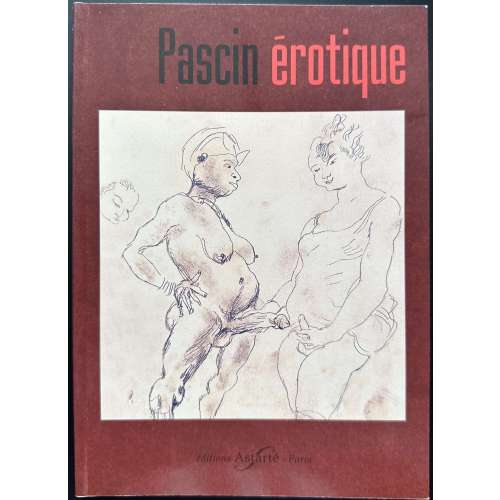 Catalogue raisonné of Pascin's erotic drawings. Softcover, 21 x 15 cm, burgundy gloss pictorial paperback with lettering and vignettes, pp.: [1-3] 4-102 [2], illustrated throughout. Limited edition of 1,000 copies. Title-page: Pascin érotique | {round vignette} | éditions Astarté - Paris || Contributors: Alexandre Dupouy (French) Pascin, Jules [Pincas, Julius Mordecai] (French-Jewish, 1885 – 1930)
Catalogue raisonné of Pascin's erotic drawings. Softcover, 21 x 15 cm, burgundy gloss pictorial paperback with lettering and vignettes, pp.: [1-3] 4-102 [2], illustrated throughout. Limited edition of 1,000 copies. Title-page: Pascin érotique | {round vignette} | éditions Astarté - Paris || Contributors: Alexandre Dupouy (French) Pascin, Jules [Pincas, Julius Mordecai] (French-Jewish, 1885 – 1930) -
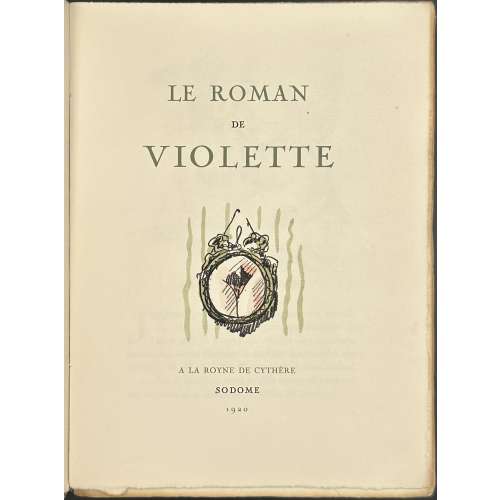 Softcover volume, 19.5 x 14.3 cm, olive French flapped wrappers, glassine dust cover, printed on laid paper (Hollande), outer and bottom margins untrimmed, some pages uncut; pagination: [2] blank, [i-iv] h.t./limit., t.p./blank, v-viii, 1-196 [197] [5], total 212 pages plus frontispiece; head- and tailpieces and in-text stencil-coloured etchings after Chéripoulos. Title-page (olive and black): LE ROMAN | DE | VIOLETTE | {vignette} | A LA ROYNE DE CYTHÈRE | SODOME | 1920 || Limitation: Cet ouvrage, achevé d'imprimer le cinq Janvier Mil Neuf Cent Vingt à trois cents exemplaires dont vingt-cinq exemplaires sur Japon Impérial contenant chacun un dessin original de Chéripoulos, numérotés de un à vingt-cinq; deux cent soixante-quinze exemplaires sur papier de Hollande, numérotés de vingt-six à trois cents; en plus cinq exemplaires de collaborateurs marqués de A à E. Le présent exemplaire porte le numéro 72. Edition: Printed on the 5th of January 1920 in 305 copies (№№ 1-25 on Japon Impérial, №№ 26-300 on Hollande, A–E for collaborators). Catalogue raisonné: Dutel III № 2339, p. 350. Contributors: Henriette de Mannoury d'Ectot [Henriette Nicolas Le Blanc] (French 1815 – 1899) Charles Auguste Edelmann [Chéripoulos] (French, 1879 – 1950).
Softcover volume, 19.5 x 14.3 cm, olive French flapped wrappers, glassine dust cover, printed on laid paper (Hollande), outer and bottom margins untrimmed, some pages uncut; pagination: [2] blank, [i-iv] h.t./limit., t.p./blank, v-viii, 1-196 [197] [5], total 212 pages plus frontispiece; head- and tailpieces and in-text stencil-coloured etchings after Chéripoulos. Title-page (olive and black): LE ROMAN | DE | VIOLETTE | {vignette} | A LA ROYNE DE CYTHÈRE | SODOME | 1920 || Limitation: Cet ouvrage, achevé d'imprimer le cinq Janvier Mil Neuf Cent Vingt à trois cents exemplaires dont vingt-cinq exemplaires sur Japon Impérial contenant chacun un dessin original de Chéripoulos, numérotés de un à vingt-cinq; deux cent soixante-quinze exemplaires sur papier de Hollande, numérotés de vingt-six à trois cents; en plus cinq exemplaires de collaborateurs marqués de A à E. Le présent exemplaire porte le numéro 72. Edition: Printed on the 5th of January 1920 in 305 copies (№№ 1-25 on Japon Impérial, №№ 26-300 on Hollande, A–E for collaborators). Catalogue raisonné: Dutel III № 2339, p. 350. Contributors: Henriette de Mannoury d'Ectot [Henriette Nicolas Le Blanc] (French 1815 – 1899) Charles Auguste Edelmann [Chéripoulos] (French, 1879 – 1950). -
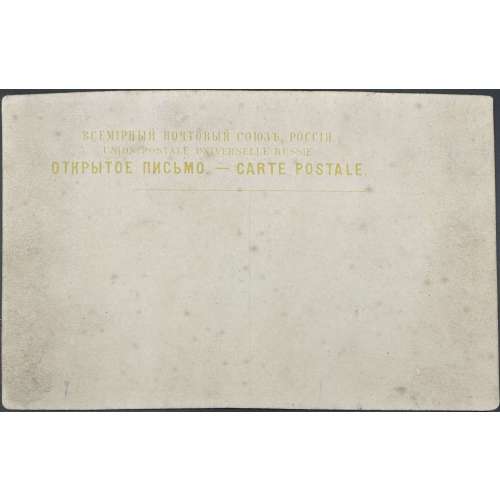 Ten postcards 90 x 140 mm, text in yellow "ВСЕМIРНЫЙ ПОЧТОВЫЙ СОЮЗЪ. РОССIЯ. | UNION POSTALE UNIVERSELLE RUSSIE. | ОТКРЫТОЕ ПИСЬМО. — CARTE POSTALE. || On the reverse, a blue ink woodcut image is printed in the upper left corner, and a blue ink numbered image title is in the bottom centre. Holding the postcard against the backlight reveals a hidden image of an indecent nature (erotic). The use of Latin characters "R" and "N" instead of Russian "Р" and "Н" suggests that the cards were produced in Europe, probably in France. Inscriptions: 1. ПЕRВЫЕ ДNИ; 2. ПОRА ЛЮБВИ; 3. ВЪ ЛЮДИ; 4. КЪ "СВОБОДNОМУ ИСКУССТВУ"; 5. "СВОБОДNЫЙ ТRУДЪ; 6. БЕЗЪ ГОRЯ И ПЕЧАЛИ; 7. NАЗАДЪ КЪ "СВОБОДNОЙ ЛЮБВИ"; 8. ВСЕ ЧТО ОСТАЛОСЬ!; 9. БЕЗЪ КRОВА И ПRИСТАNИЩА; 10. ИЗЪ ЗА ХЛѢБА.
Ten postcards 90 x 140 mm, text in yellow "ВСЕМIРНЫЙ ПОЧТОВЫЙ СОЮЗЪ. РОССIЯ. | UNION POSTALE UNIVERSELLE RUSSIE. | ОТКРЫТОЕ ПИСЬМО. — CARTE POSTALE. || On the reverse, a blue ink woodcut image is printed in the upper left corner, and a blue ink numbered image title is in the bottom centre. Holding the postcard against the backlight reveals a hidden image of an indecent nature (erotic). The use of Latin characters "R" and "N" instead of Russian "Р" and "Н" suggests that the cards were produced in Europe, probably in France. Inscriptions: 1. ПЕRВЫЕ ДNИ; 2. ПОRА ЛЮБВИ; 3. ВЪ ЛЮДИ; 4. КЪ "СВОБОДNОМУ ИСКУССТВУ"; 5. "СВОБОДNЫЙ ТRУДЪ; 6. БЕЗЪ ГОRЯ И ПЕЧАЛИ; 7. NАЗАДЪ КЪ "СВОБОДNОЙ ЛЮБВИ"; 8. ВСЕ ЧТО ОСТАЛОСЬ!; 9. БЕЗЪ КRОВА И ПRИСТАNИЩА; 10. ИЗЪ ЗА ХЛѢБА. -
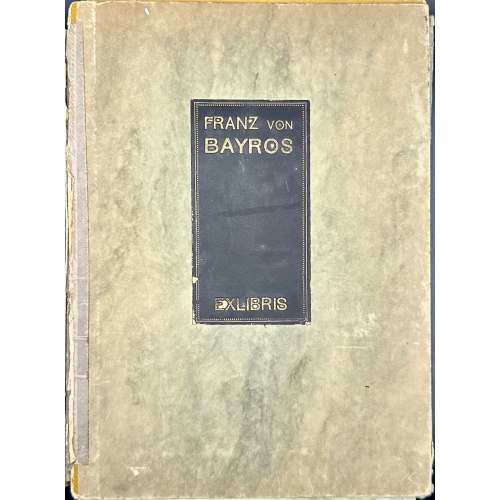 A set of 49 prints, heliogravures and etchings, tipped-in on 285 x 257 mm grey cards, in a green marbled folder with a gilt-lettered black label to the front. No publisher, no place, no year (s.l., s.n., s.d.), printed in circa 1910.
A set of 49 prints, heliogravures and etchings, tipped-in on 285 x 257 mm grey cards, in a green marbled folder with a gilt-lettered black label to the front. No publisher, no place, no year (s.l., s.n., s.d.), printed in circa 1910.- Vlastimil Blažek (Czech, 1878 – 1950): heliogravure, sheet 180 x 137 mm, plate 152 x 114 mm; laid paper, black sepia ink; unsigned.
- Ex libris Gerhard Wunderlich (architect in Dresden): heliogravure, sheet 205 x 150 mm, plate 158 x 115 mm; wove paper, brown sepia ink; inscription: heliogravure, sheet 180 x 137 mm, plate 152 x 114 mm; laid paper, sepia ink; inscription to top “Es ist alles so eng”; signed “F (backwards). Bayros”.
- Ex libris William Lipka: heliogravure, sheet 140 x 125 mm, plate 112 x 98 mm; laid paper, black sepia ink; signature hardly legible.
- Nikolaus Schindler (amateur photographer in Vienna): heliogravure, sheet 142 x 150 mm, plate 110 x 117 mm; laid paper, black sepia ink; unsigned.
- Sussy de Coiquard: heliogravure, sheet 160 x 140 mm, plate 128 x 110 mm; laid paper, black sepia ink; unsigned.
- Illegible, looks like “Vielluer Febréy”: heliogravure, sheet 120 x 109 mm, plate 93 x 85 mm; laid paper, black, sepia ink; signed “F (backwards). Bayros:”.
- Ex libris Erich Liebermann-Rosswiese (Greman-Jewish, 1886 – 1942): heliogravure, sheet 180 x 139 mm, plate 118 x 88 mm; wove paper, black sepia ink; unsigned.
- Ex libris Dr. phil. Rudolf Ludwig: before letters, heliogravure, sheet 150 x 132 mm, plate 120 x 110 mm; laid paper, black sepia ink; unsigned. See [LIB-3258.2023] John Cleland. Die Memoiren der Fanny Hill. — Paphos [i.e. Vienna]: C. W. Stern, 1906.
- Unidentified: before letters, heliogravure, sheet 150 x 115 mm, plate 113 x 88 mm; laid paper, black sepia ink; signed “F. Bayros” in the manuscript. Circumstantial evidence tells that this bookplate belongs to someone A.W.(Artur Wolf). See №22.
- Lulu. Monachia. Gest. v. Ritter Dialekt und Junker Erich: heliogravure, sheet 204 x 152 mm, plate 160 x 118 mm; wove paper, black sepia ink; unsigned. See №20.
- Kellner Jstván: (István): heliogravure, sheet 118 x 100 mm, plate 85 x 70 mm; laid paper, black sepia ink; signed “Franz Bayros” in the script (hardly legible).
- Adyton: heliogravure, sheet 170 x 130 mm, plate 113 x 85 mm; wove paper, black, sepia ink; signed “F (backwards). Bayros”.
- 13.Ex libris George Arthur Buhl (American, 1883 – 1959): heliogravure, sheet 166 x 140 mm, plate 120 x 92 mm; wove paper, black sepia ink; inscription “!I will! | !And I can!”; bust inscribed “T. Carlyle”; signed “F (backwards). Bayros” (hardly legible).
- Ex-Libris Heinrich und Lise Fuhrmann: heliogravure, sheet 165 x 149 mm, plate 120 x 103 mm; wove paper, black sepia ink; signed “F (backward). Bayros”; inscription “So schaff ich am sausenden Webstuhl der Zeit und wirke der Gottheit lebendiges Kleid” (from ‘Faust’ by Goethe).
- Ex libris Gerhard Wunderlich (architect in Dresden): heliogravure, sheet 165 x 137 mm, plate 135 x 105 mm; laid paper, black, sepia ink; signed “F (backwards). Bayros”.
- Ex Libris Walther u. Amelia Fahrenhorst; Walter Fahrenhorst (German, 1871 – 1938): heliogravure, sheet 165 x 140 mm, plate 128 x 95 mm; wove paper, black sepia ink; signed “F. Bayros” in the manuscript. The inscription behind the strings: NITOR (lat. beauty, glamour).
- Ex Libris Margot Lewknecht; heliogravure, sheet 145 x 140 mm, plate 128 x 118 mm; laid paper, black sepia ink; signed “F. Bayros”.
- Ex Libris Walther Heinisch (publisher in Carlsbad); heliogravure, sheet 185 x 145 mm, plate 140 x 110 mm; wove paper, sanguine; male bust with an inscription to the base: “Arnold Boeklin” / Arnold Böcklin (Swiss, 1827 – 1901); inscription: “mit gêru scal man geba infâhan” – a line from Hildebrandslied, the earliest poetic text in German. Unsigned.
- Bookplate with music score GGDBGC; heliogravure, sheet 125 x 135 mm, plate 100 x 110 mm, with monogram «HCJ»; laid paper, brown sepia ink; signed “F. Bayros”.
- Bookplate with inscription: Lulu aus Praga | Gest v. Ritter Dialekt / Monachia / Monachia / und Junker Erich; heliogravure, sheet 182 x 147 mm, plate 160 x 120 mm, image 122 x 105 mm; wove paper, bluish-black sepia ink; unsigned. See №10.
- Bookplate, no inscription; heliogravure, laid paper, sepia ink, sheet 148 x 127 mm, image 84 x 79 mm; signed F. Bayros in the manuscript beneath the image.
- Ex libris Artur Wolf: heliogravure, laid paper, sepia ink, sheet 170 x 150 mm, image 120 x 105 mm; signed F. Bayros in the manuscript to the frame of the image. See №9.
- Ex Libris E. K. Weigl: heliogravure, laid paper, sepia ink, sheet 139 x 121 mm, plate 112 x 97 mm; unsigned; inscription above male portrait: “LEONARDO”.
- Ex libris Dr. A. Bergmann: heliogravure, wove paper, sepia ink; sheet 180 x 140 mm, plate 130 x 105 mm; signed F. Bayros in the manuscript.
- Grete Cäcilie (monogram “PS”): heliogravure, laid paper, sepia ink, sheet 161 x 130 mm, plate 128 x 103 mm, signature illegible.
- Emma Steigleder: heliogravure, laid paper, black ink, sheet 181 x 141 mm, plate 158 x 117 mm, signed F. Bayros in the manuscript. Inscription “Si vis amari, ama! Seneca” [If you want to be loved, love] to the attic of the arch.
- Bruno Fischer: heliogravure, laid paper, sepia ink, sheet 186 x 145 mm, plate 155 x 116 mm, signed “F (backward). Bayros”. Inscription to bottom “Gehl Weck’ ihn nicht auf seien wir froh dass er einmal schläft!”
- Harnasch: heliogravure, wove paper, sepia ink; unsigned; sheet 140 x 132 mm, plate 100 x 85 mm; unsigned.
- Eduard Klampfl: heliogravure, laid paper, sepia ink, sheet 165 x 145 mm, plate 135 x 110 mm, signed “F (backwards). Bayros”; portrait bust of the composer Richard Wagner (German, 1813 –1883).
- Jorge Monsalvatje: heliogravure, wove paper, sepia ink; sheet 189 x 160 mm, plate 150 x 115 mm; signed F. Bayros in the manuscript.
- E. K. W.: wove paper, sepia ink; sheet 150 x 120 mm; signed “Bayros”.
- Unidentified bookplate: wove paper, sepia ink; sheet 150 x 120 mm; signed “F. Bayros 09” in the manuscript.
- Ex-Libris Helene and Emil Lemberger: heliogravure (or soft ground etching), laid paper, sepia ink, sheet 180 x 163 mm, plate 150 x 130 mm, signed “F. Bayros” in the manuscript.
- M. Z.: wove paper, sepia ink; sheet 130 x 170 mm, plate 90 x 120 mm; signed “F (backwards) Bayros”.
- Ex libris Frankl Frigyes Vilmos: heliogravure (or soft ground etching), laid paper, sepia ink, sheet 140 x 148 mm, unsigned. Frigyes Frankl, born in Tejfalu, Szlovákia, died in 1943.
- Ex libris Anton Bürck: heliogravure, wove paper, sepia ink; sheet 170 x 137 mm, plate 123 x 104 mm; unsigned. Anton Burck (German,1881 – 1951) of Palatinate, Bavaria.
- Aus den büchern A. W.: heliogravure, laid paper, sepia ink, sheet 152 x 136 mm, plate 120 x 105 mm, signed “F. Bayros” in the manuscript.
- Ex libris Hans Hickl: heliogravure, laid paper, sepia ink, sheet 150 x 125 mm, plate 115 x 95 mm, signed “Ω”.
- Ex libris Karl Wehle: soft ground etching, laid paper, brown sepia ink, sheet 107 x 90 mm, plate 80 x 65 mm, inscription “Gut!” in the centre; unsigned. Karl Wehle (Austrian, 1901 – 1933)
- Ex libris Dr. Paul Berger: etching, laid paper, black ink, sheet 140 x 115 mm, plate 115 x 85 mm, signed “F (backwards). Bayros”.
- Unidentified bookplate: etching, laid paper, black ink, sheet 145 x 115 mm, plate 85 x 70 mm, unsigned.
- Ex Bibliotheca Erotica Carl Georg von Maassen: soft ground etching, india paper, black ink, sheet 76 x 78 mm, signed “FB”.
- Ex Bibliotheca Erotica Carl Georg von Maassen: soft ground etching, india paper, black ink, sheet 79 x 79 mm, signed “F. von Bayros”.
- Paul Mixa: soft ground etching, laid paper, sanguine ink, sheet 122 x 111 mm, plate 90 x 85 mm, inscription: “Gerne hör’ich wenn du singest und ich horche wenn du schweigest” [I like to hear when you sing and I listen when you are silent].
- Ex libris Drs Q. M. Vyskocil.: etching, laid paper, sanguine ink, sheet 141 x 115 mm, plate 115 x 75 mm, inscription: “MIT REINEN HAENDEN” [with pure hands], signed “F. Bayros” in the manuscript.
- Ex libris Andrée Bearn de Riquer: soft ground etching, laid paper, sanguine ink, sheet 136 x 88 mm, plate 100 x 62 mm, signed “F (backwards). Bayros”. Andrée Béarn [Marguerite Laborde] (French, 1880 – 1973), spouse of Alexandre de Riquer (Catalan, 1856 – 1920).
- Ex musicis Drs Blažek VL: etching, wove paper, sanguine ink, sheet 141 x 116 mm, plate 115 x 90 mm, inscription: “MIT REINEN HAENDEN” [with pure hands], signed “F. Bayros” in the manuscript. See Vlastimil Blažek (Czech, 1878 – 1950) № 1 in this series.
- Ex libris Paul Lindenberg: etching, wove paper, sanguine ink, sheet 130 x 114 mm, plate 95 x 90 mm, image 80 x 72 mm, inscription: “ad pios usus” (for pious uses); signed with monogram “F (backwards). B”.
- Unidentified bookplate: heliogravure, laid paper, sanguine ink, sheet 150 x 131 mm, plate 120 x 100 mm, signed “F. Bayros” in the manuscript.
-
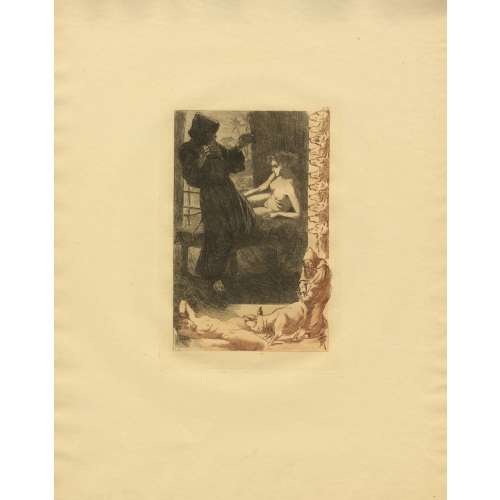 Set of 21 etchings by Martin van Maele for the English edition of ‘Thais’ by Anatole France published in London by Charles Carrington in 1901. Printed on vowe paper without a watermark in two colours with the black image and sepia historiated border. All etchings are inscribed with the artist's monogram; one of the etchings bears inscriptions ORGUEIL, LUXURE, DOUTE (mirror image). Dimensions: sheet: 317 x 250 mm; plate: 170 x 115 mm; image: 155 x 100 mm. Catalogue raisonné: S. A. Perry: № 64. Per Perry, the edition was printed in 500 copies on 'handmade paper watermarked 'Van Gelder'. Contributor: Martin van Maële [Martin, Maurice François Alfred] (French, 1863 – 1926)
Set of 21 etchings by Martin van Maele for the English edition of ‘Thais’ by Anatole France published in London by Charles Carrington in 1901. Printed on vowe paper without a watermark in two colours with the black image and sepia historiated border. All etchings are inscribed with the artist's monogram; one of the etchings bears inscriptions ORGUEIL, LUXURE, DOUTE (mirror image). Dimensions: sheet: 317 x 250 mm; plate: 170 x 115 mm; image: 155 x 100 mm. Catalogue raisonné: S. A. Perry: № 64. Per Perry, the edition was printed in 500 copies on 'handmade paper watermarked 'Van Gelder'. Contributor: Martin van Maële [Martin, Maurice François Alfred] (French, 1863 – 1926) -
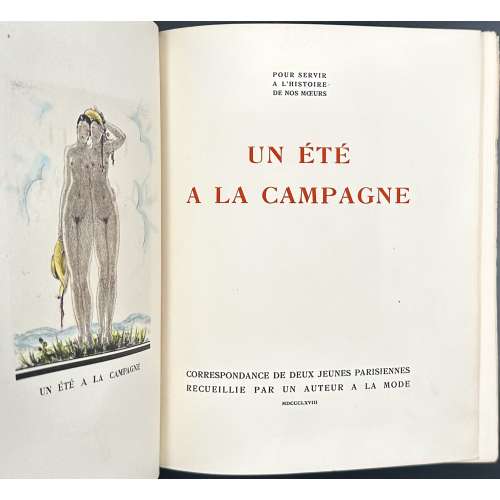 Softcover, 228 x 180 mm, tan French flapped wrappers with red lettering to front[1-4, owner’s glassine dustcover, top edge trimmed, printed on thick wove paper without a watermark; pp.: ffl [1-4 h.t., t.p.] 5-154 [2 blanks] colophon to back ffl recto, plus 12 plates with hand-coloured lithographs, extraneous to collation. Pencil and pigment drawing to h.t. signed “J. D’A” with gift manual inscription “A Monsieur et Madame Chalamel [sic] ce tardif mais sincère souvenir de sympathie”, signed “J et Y D’A.” Etching bookplate to front ffl recto: “EX LIBRIS PIERRE CHALLAMEL | JE FONCE DANS LE BROUILLARD”, signed “J A M” (Jean-Adrien Mercier). The signature J. D’A stands for Jean d’Angers, while Y D’A stands for Jean-Adrien’s wife Yvonne (1902—1999), nicknamed Zizi; they married in 1927. According to J.-P. Dutel, the stated illustrator of this edition, Jean d’Angers is indeed Jean-Adrien Mercier. The text belongs to Gustav Droz and, possibly, Auguste Poulet-Malassis. Limitation: the book was printed for subscribers in 30 copies on Japon Impériale paper (№№ 1-30) and 250 copies on vélin du Marais paper (№№ 31-280). This copy bears № 123 and was presented as a gift by the artist and his wife to Pierre Challamel. Title-page (red and black): POUR SERVIR | A L'HISTOIRE | DE NOS MŒURS | UN ÉTÉ | A LA CAMPAGNE | CORRESPONDANCE DE DEUX JEUNES PARISIENNES | RECUEILLIE PAR UN AUTEUR A LA MODE | MDCCCLXVIII || Catalogue raisonné: Dutel III № 2546; honesterotica. Provenance: Pierre Challamel (French, 20th century) Contributors: Gustave Droz (French, 1832 – 1895) – author (presumable). Auguste Poulet-Malassis (French, 1825 – 1878) – author (presumable). Jean-Adrien Mercier (French, 1899 – 1995) – artist. Micro photo of the lithography:
Softcover, 228 x 180 mm, tan French flapped wrappers with red lettering to front[1-4, owner’s glassine dustcover, top edge trimmed, printed on thick wove paper without a watermark; pp.: ffl [1-4 h.t., t.p.] 5-154 [2 blanks] colophon to back ffl recto, plus 12 plates with hand-coloured lithographs, extraneous to collation. Pencil and pigment drawing to h.t. signed “J. D’A” with gift manual inscription “A Monsieur et Madame Chalamel [sic] ce tardif mais sincère souvenir de sympathie”, signed “J et Y D’A.” Etching bookplate to front ffl recto: “EX LIBRIS PIERRE CHALLAMEL | JE FONCE DANS LE BROUILLARD”, signed “J A M” (Jean-Adrien Mercier). The signature J. D’A stands for Jean d’Angers, while Y D’A stands for Jean-Adrien’s wife Yvonne (1902—1999), nicknamed Zizi; they married in 1927. According to J.-P. Dutel, the stated illustrator of this edition, Jean d’Angers is indeed Jean-Adrien Mercier. The text belongs to Gustav Droz and, possibly, Auguste Poulet-Malassis. Limitation: the book was printed for subscribers in 30 copies on Japon Impériale paper (№№ 1-30) and 250 copies on vélin du Marais paper (№№ 31-280). This copy bears № 123 and was presented as a gift by the artist and his wife to Pierre Challamel. Title-page (red and black): POUR SERVIR | A L'HISTOIRE | DE NOS MŒURS | UN ÉTÉ | A LA CAMPAGNE | CORRESPONDANCE DE DEUX JEUNES PARISIENNES | RECUEILLIE PAR UN AUTEUR A LA MODE | MDCCCLXVIII || Catalogue raisonné: Dutel III № 2546; honesterotica. Provenance: Pierre Challamel (French, 20th century) Contributors: Gustave Droz (French, 1832 – 1895) – author (presumable). Auguste Poulet-Malassis (French, 1825 – 1878) – author (presumable). Jean-Adrien Mercier (French, 1899 – 1995) – artist. Micro photo of the lithography:
Micro photo of the original drawing: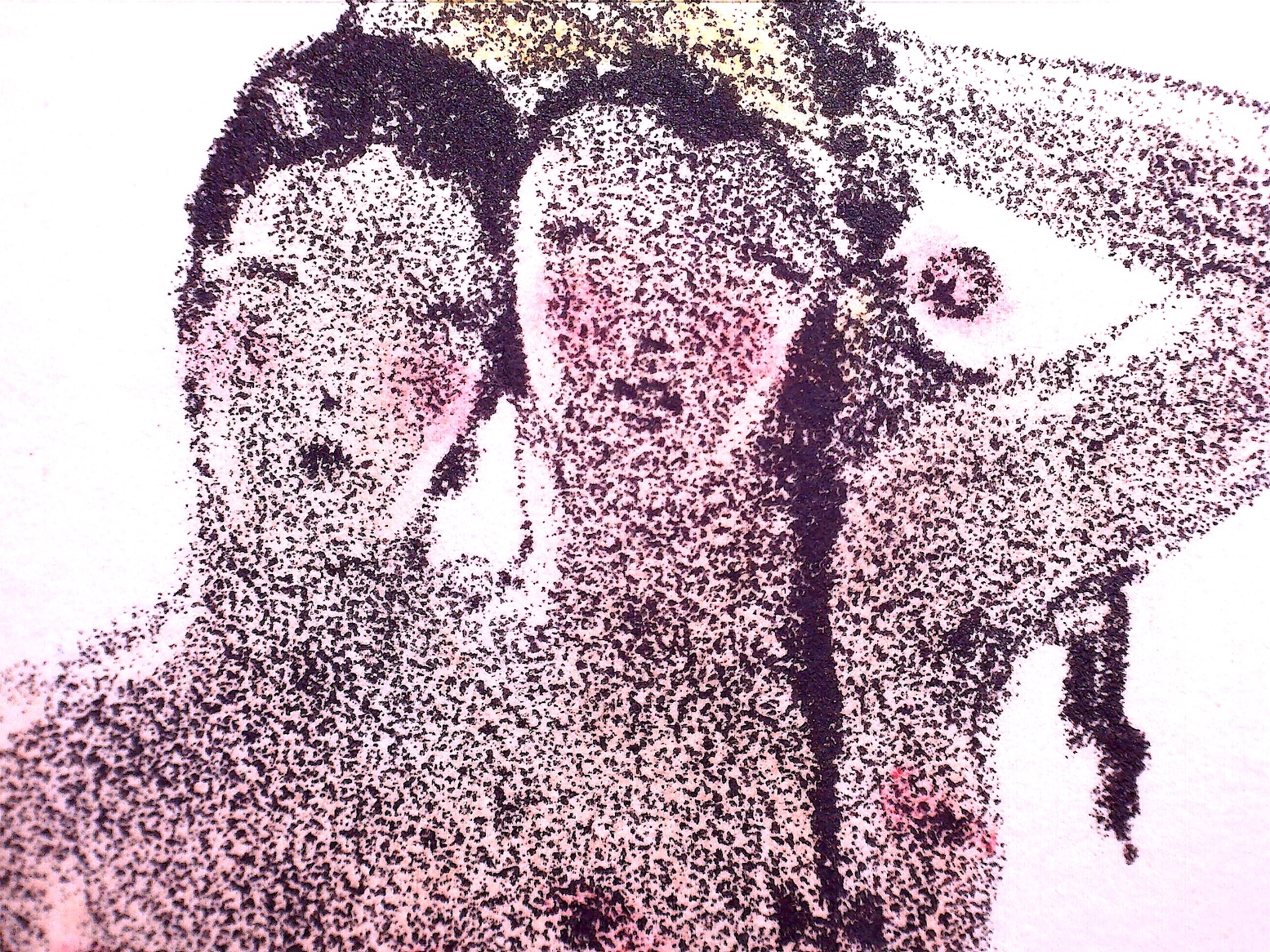
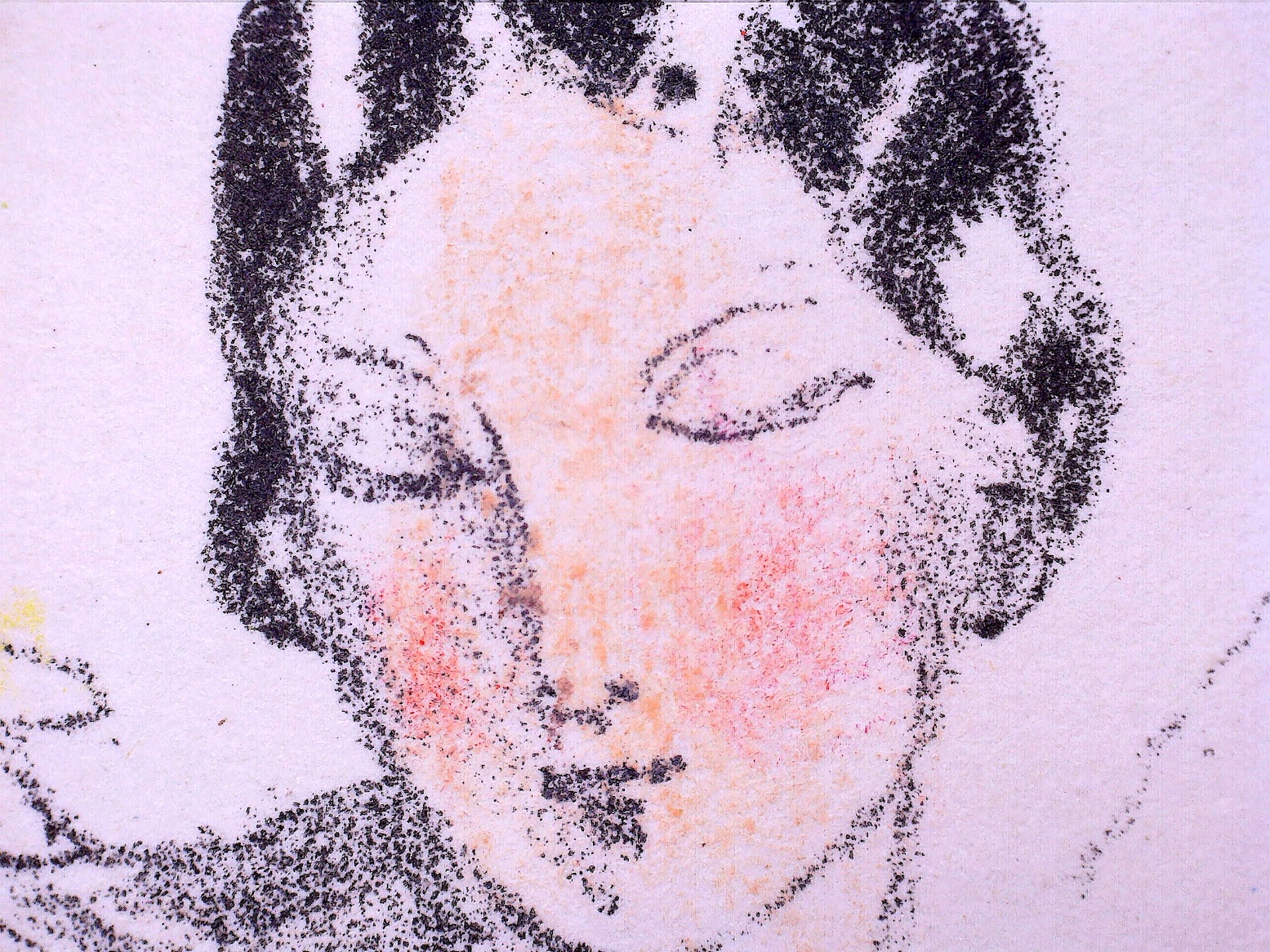
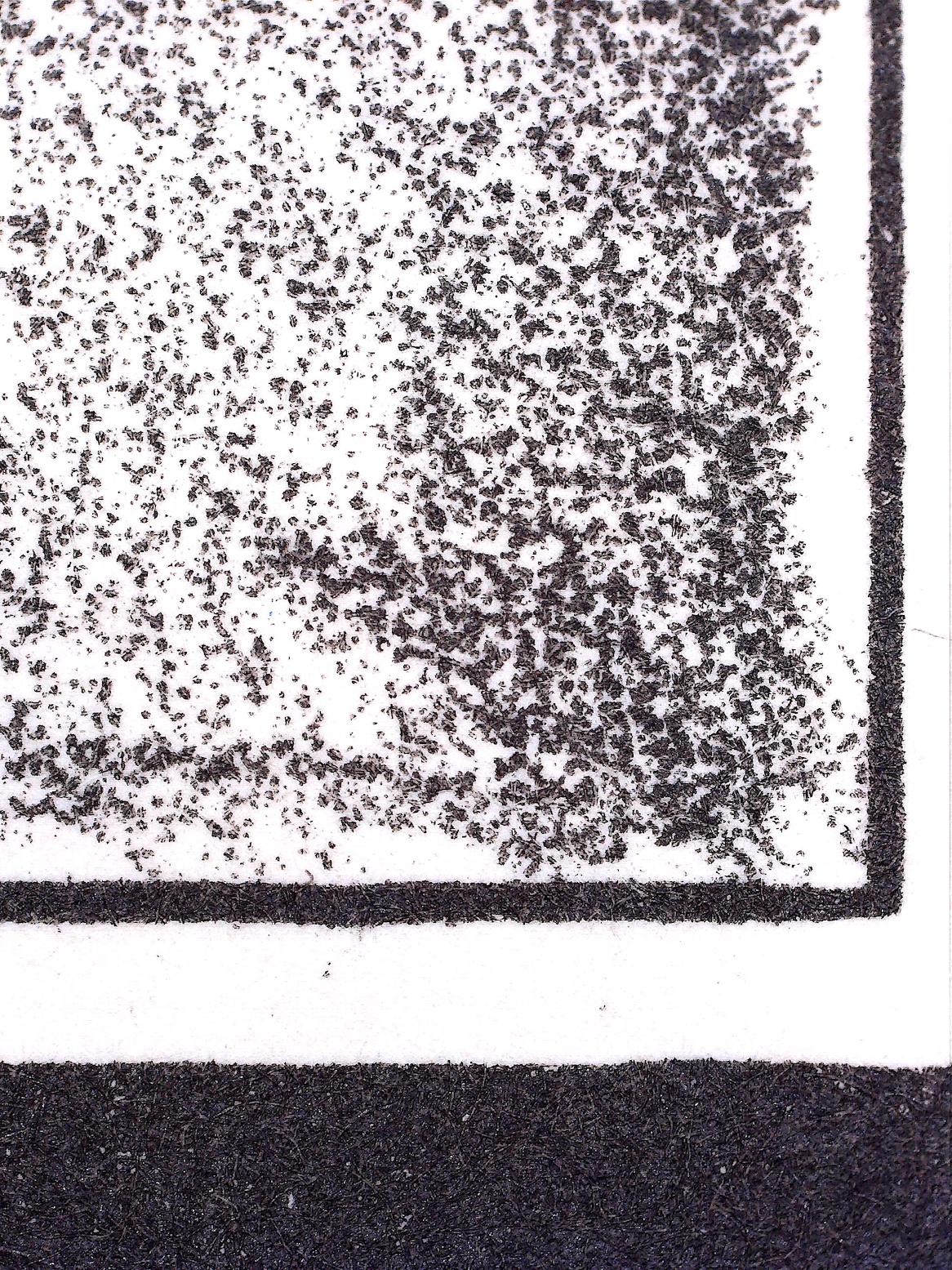
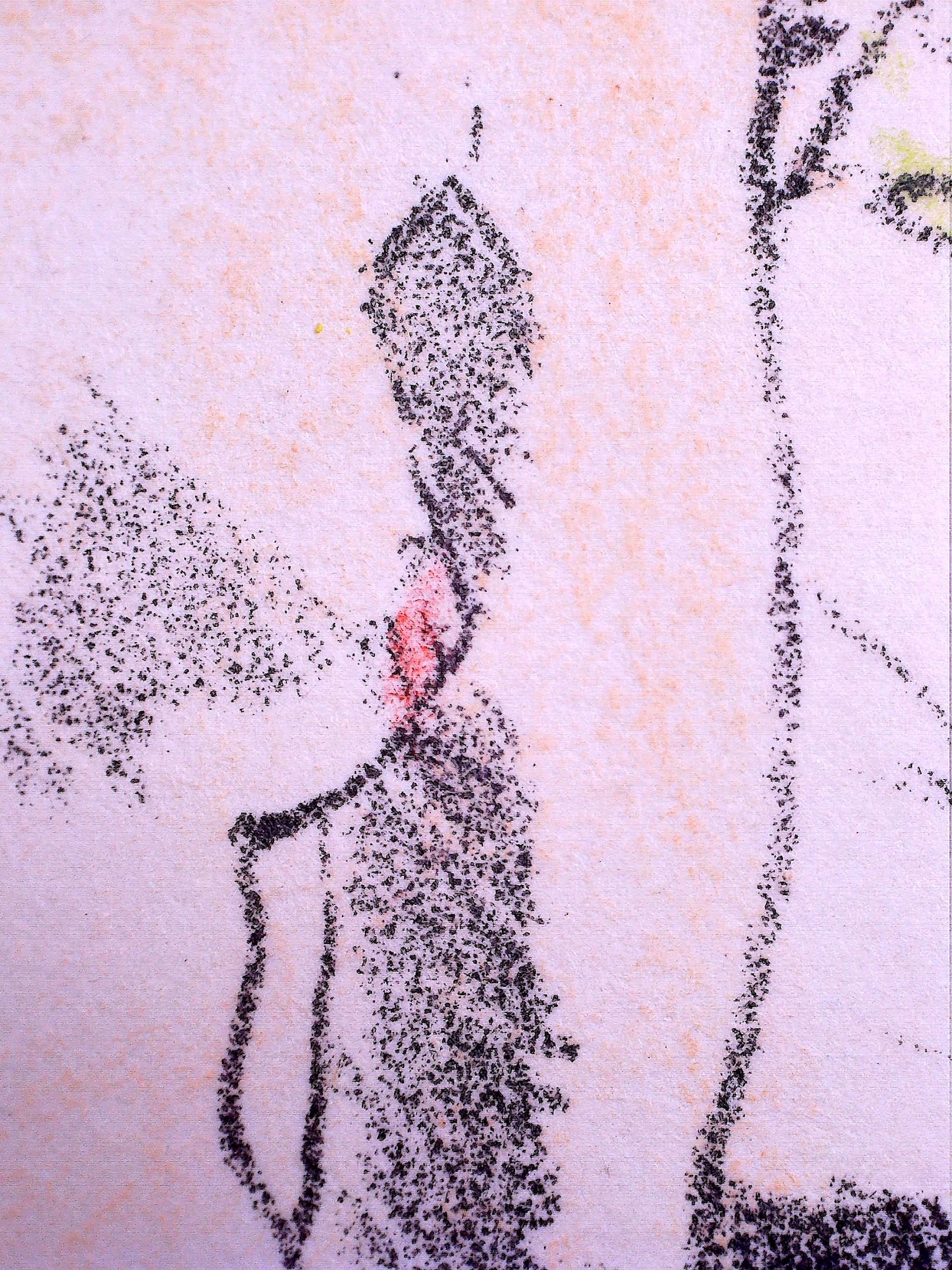
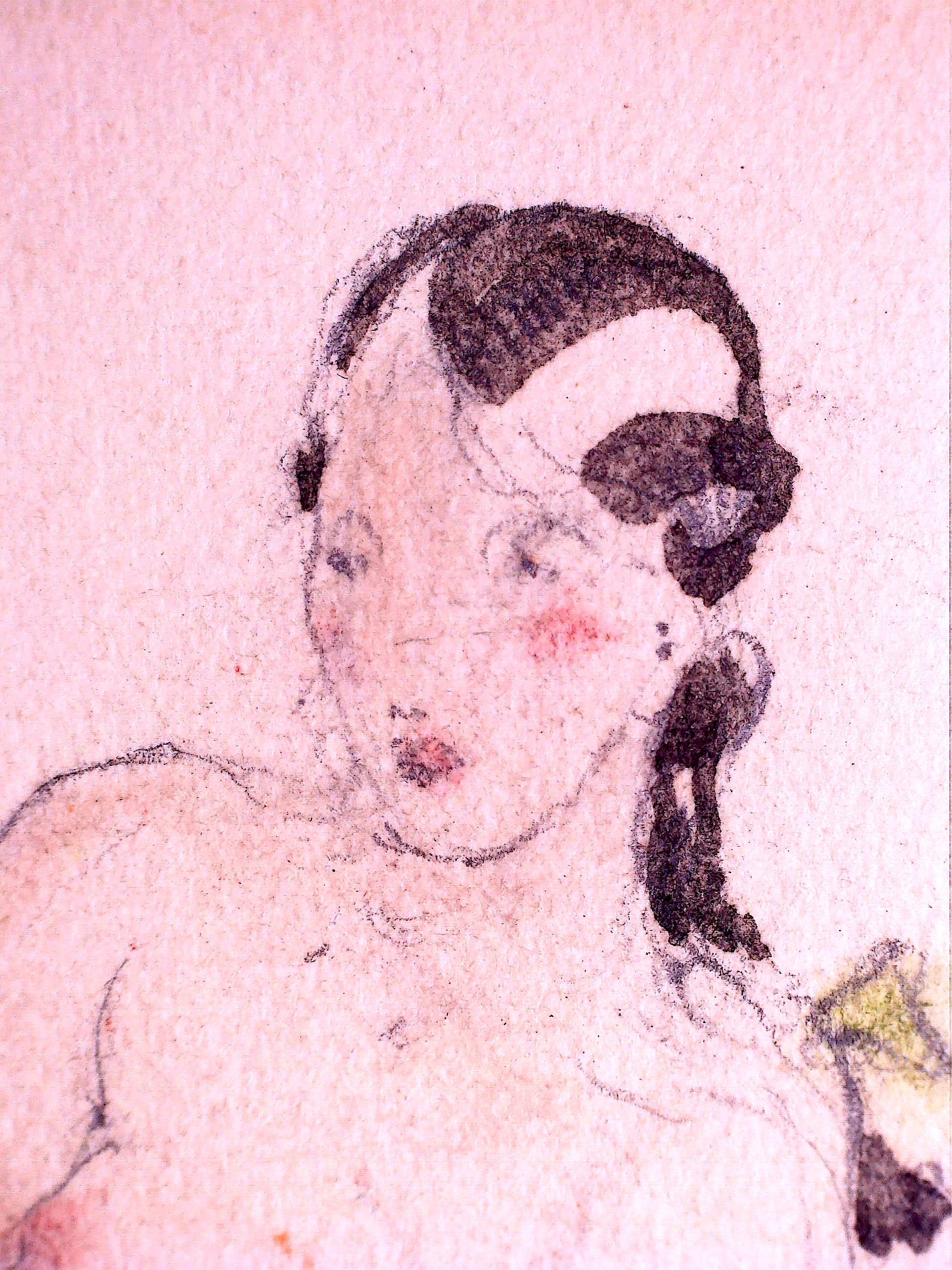
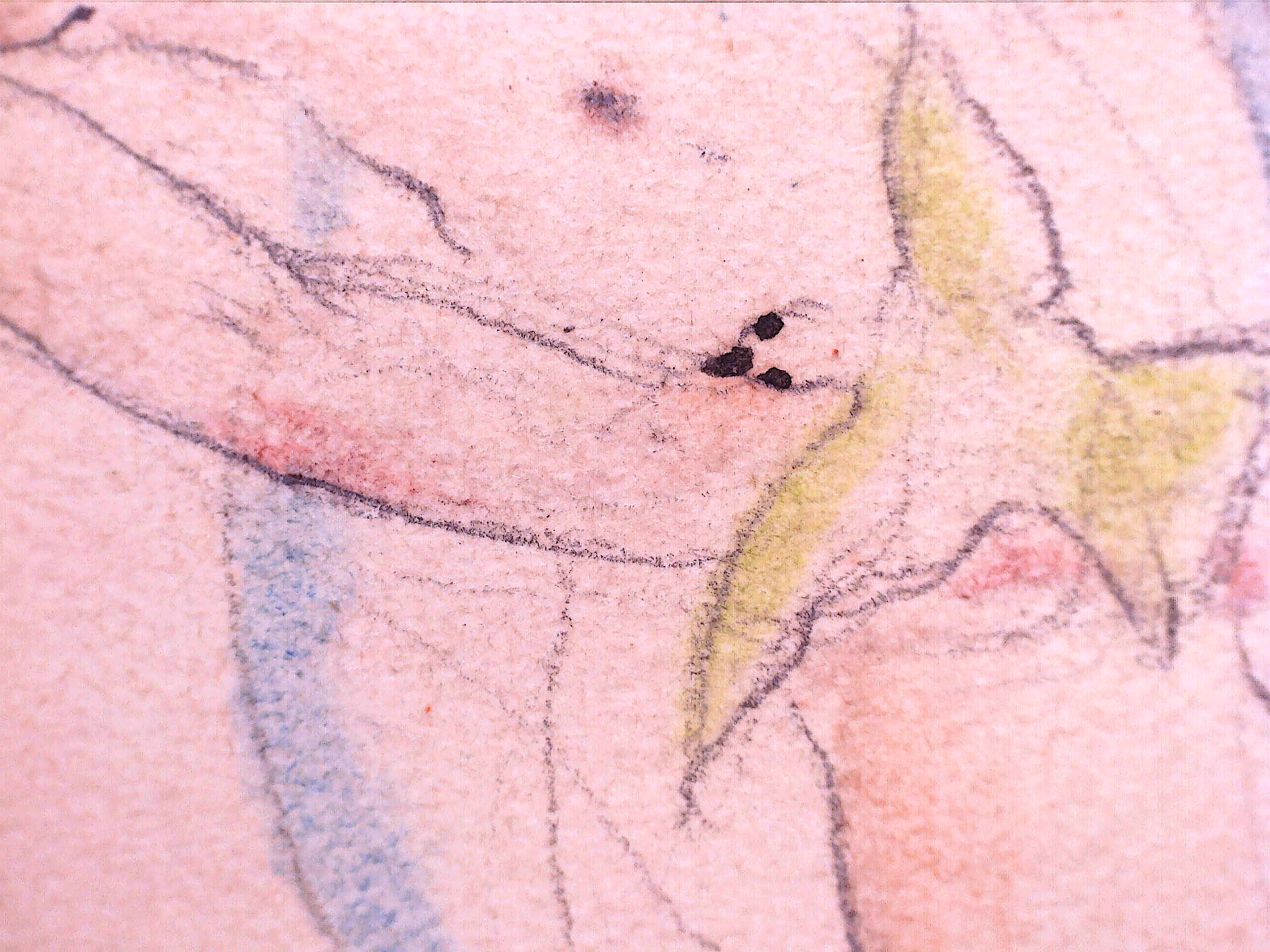
-
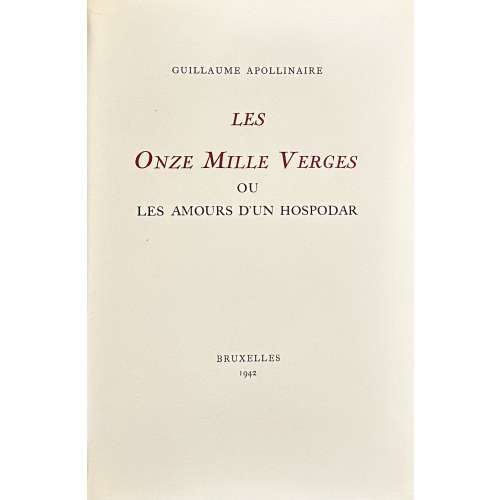 Softcover, 257 x 168 mm, publisher’s cream French flapped wrappers with red lettering to front in a beige double slipcase, printed on wove paper watermarked “Marais” in italic script; edges untrimmed; pp.: [8] [2] [1] 2-130 [131] [3]; collated 4to as 184, 72 leaves incl. those in the wrappers, plus 9 photomechanical stencil-coloured plates extraneous to collation and 9 b/w headpieces (in-text etchings) after anonymous artist. According to the seller and J.-P. Dutel: “In-8 of 130 pages... Illustrated with 10 full-page in colour and some headbands. Limited edition of 500 copies on vélin du Marais". Title-page (red and black): GUILLAUME APOLLINAIRE | LES | ONZE MILLE VERGES | OU | LES AMOURS D'UN HOSPODAR | BRUXELLES | 1942 || Limitation: Il a été tiré de cet ouvrage réservé uniquement aux souscripteurs particuliers 500 exemplaires tous sur vélin du marais. Exemplaire n° 147. Edition: The clandestine edition on vélin de Marais paper limited to 500 copies for subscribers only; this copy is № 147. Catalogue raisonné: Dutel III № 2109. In my copy, similarly to the one of STEVE M., it is only 9 colour plates, while Dutel sites 10. Author: Guillaume Apollinaire (French, 1880 – 1918). Micro photo of a colour plate:
Softcover, 257 x 168 mm, publisher’s cream French flapped wrappers with red lettering to front in a beige double slipcase, printed on wove paper watermarked “Marais” in italic script; edges untrimmed; pp.: [8] [2] [1] 2-130 [131] [3]; collated 4to as 184, 72 leaves incl. those in the wrappers, plus 9 photomechanical stencil-coloured plates extraneous to collation and 9 b/w headpieces (in-text etchings) after anonymous artist. According to the seller and J.-P. Dutel: “In-8 of 130 pages... Illustrated with 10 full-page in colour and some headbands. Limited edition of 500 copies on vélin du Marais". Title-page (red and black): GUILLAUME APOLLINAIRE | LES | ONZE MILLE VERGES | OU | LES AMOURS D'UN HOSPODAR | BRUXELLES | 1942 || Limitation: Il a été tiré de cet ouvrage réservé uniquement aux souscripteurs particuliers 500 exemplaires tous sur vélin du marais. Exemplaire n° 147. Edition: The clandestine edition on vélin de Marais paper limited to 500 copies for subscribers only; this copy is № 147. Catalogue raisonné: Dutel III № 2109. In my copy, similarly to the one of STEVE M., it is only 9 colour plates, while Dutel sites 10. Author: Guillaume Apollinaire (French, 1880 – 1918). Micro photo of a colour plate: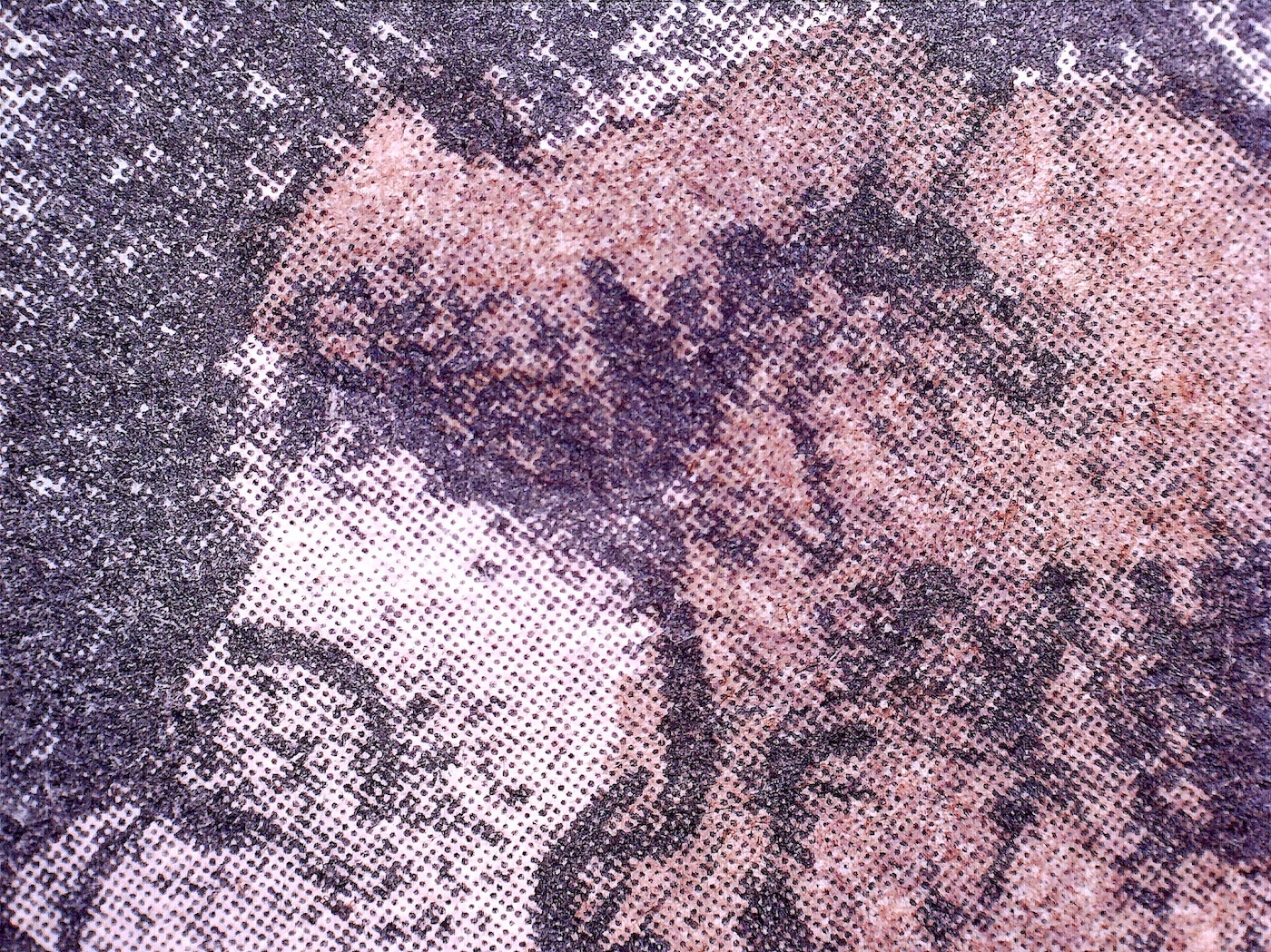 Micro photo of an etching:
Micro photo of an etching:
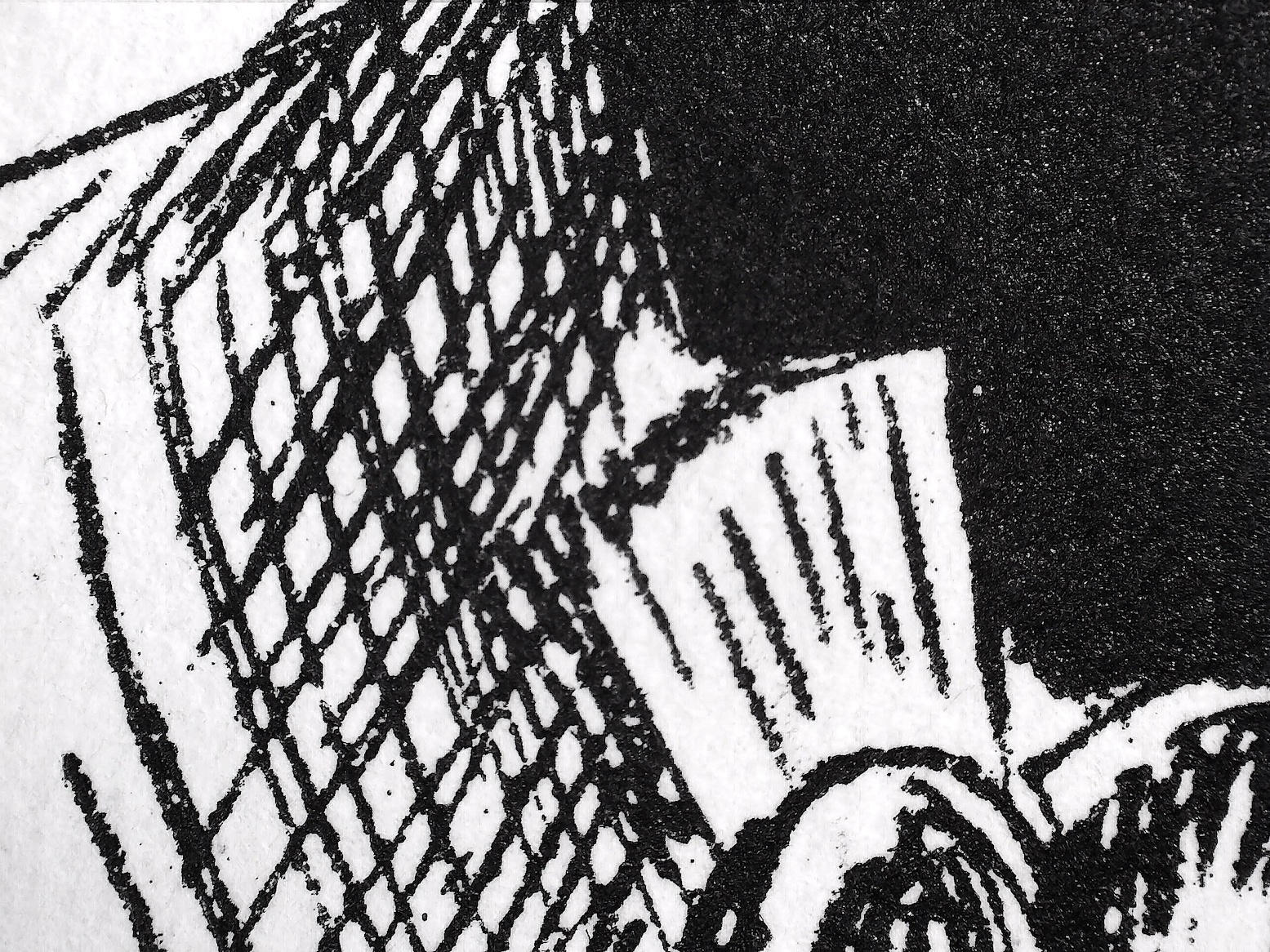
-
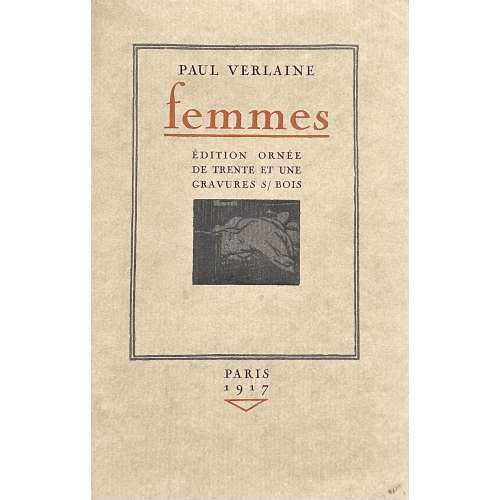 Softcover, 258 x 166 mm, publisher’s olive French flapped wrappers in owner’s glassine dustcover, edges untrimmed, some pages uncut, printed on thick wove paper with watermark “Hollande van Gelder Zonen”, in a slipcase. Pp.: [1-10] 11-129 [5], pages in wrappers included in the count, total 67 leaves; two-tone woodcuts by Jean-Gabriel Daragnès within the pagination. Title-page (red and black, in a double-fillet frame): PAUL VERLAINE | femmes | ÉDITION ORNÉE | DE TRENTE ET UNE | GRAVURES S/ BOIS | {vignette} | (under the bottom frame) PARIS | 1917 | {red triangle} || Limitation: Il a été tiré de cet ouvrage : 11 15 Exemplaires sur vieux papier de Japon numérotés de I à XV; 15 20 Exemplaires sur papier de Chine numérotés de XVI à XXXV; auxquels on a joint une suite des fumés sur même papier. 250 Exemplaires sur papier vélin de Hollande Van Gelder Zonen numérotés de 1 à 250. Après le tirage les bois ont été détruits. № 1. Numbers “15” and “20” corrected manually by Daragnès (per Dutel). This is copy № of vélin de Hollande print run. Catalogue raisonné: Dutel II: № 295; Nordmann II № 544. Seller’s description: Un volume broché in-8° sous couverture illustrée et rempliée. Etui cartonné. Illustré de 31 gravures sur bois en camaïeu, attribuées à DARAGNES, la plupart très libres, dont 18 à pleine page. Tiré à [226 ou 285] ex. numérotés. 1 des [200 ou 250] sur Hollande Van Gelder Zonen. Le nôtre porte le n°1. (Dutel : 295. Pia : 501. Carteret : IV, 392 : Belle édition rare, très estimée ». Monod : 11086). Dorgelès commenta ainsi ces illustrations : « Dans ces nus voluptueux et tragiques, qui semblent à la fois s’aimer et se haïr, on retrouve la même frénésie amère qui tourmente les poèmes interdits de Verlaine » (in Catalogue de livres... Daragnès, Drouot 1924, n°55). Très rares rousseurs. TRES BON EXEMPLAIRE, toujours recherché. Contributors: Paul Verlaine (French, 1844 – 1896) – author. Jean-Gabriel Daragnès (French, 1886 – 1950) – artist/publisher.
Softcover, 258 x 166 mm, publisher’s olive French flapped wrappers in owner’s glassine dustcover, edges untrimmed, some pages uncut, printed on thick wove paper with watermark “Hollande van Gelder Zonen”, in a slipcase. Pp.: [1-10] 11-129 [5], pages in wrappers included in the count, total 67 leaves; two-tone woodcuts by Jean-Gabriel Daragnès within the pagination. Title-page (red and black, in a double-fillet frame): PAUL VERLAINE | femmes | ÉDITION ORNÉE | DE TRENTE ET UNE | GRAVURES S/ BOIS | {vignette} | (under the bottom frame) PARIS | 1917 | {red triangle} || Limitation: Il a été tiré de cet ouvrage : 11 15 Exemplaires sur vieux papier de Japon numérotés de I à XV; 15 20 Exemplaires sur papier de Chine numérotés de XVI à XXXV; auxquels on a joint une suite des fumés sur même papier. 250 Exemplaires sur papier vélin de Hollande Van Gelder Zonen numérotés de 1 à 250. Après le tirage les bois ont été détruits. № 1. Numbers “15” and “20” corrected manually by Daragnès (per Dutel). This is copy № of vélin de Hollande print run. Catalogue raisonné: Dutel II: № 295; Nordmann II № 544. Seller’s description: Un volume broché in-8° sous couverture illustrée et rempliée. Etui cartonné. Illustré de 31 gravures sur bois en camaïeu, attribuées à DARAGNES, la plupart très libres, dont 18 à pleine page. Tiré à [226 ou 285] ex. numérotés. 1 des [200 ou 250] sur Hollande Van Gelder Zonen. Le nôtre porte le n°1. (Dutel : 295. Pia : 501. Carteret : IV, 392 : Belle édition rare, très estimée ». Monod : 11086). Dorgelès commenta ainsi ces illustrations : « Dans ces nus voluptueux et tragiques, qui semblent à la fois s’aimer et se haïr, on retrouve la même frénésie amère qui tourmente les poèmes interdits de Verlaine » (in Catalogue de livres... Daragnès, Drouot 1924, n°55). Très rares rousseurs. TRES BON EXEMPLAIRE, toujours recherché. Contributors: Paul Verlaine (French, 1844 – 1896) – author. Jean-Gabriel Daragnès (French, 1886 – 1950) – artist/publisher. -
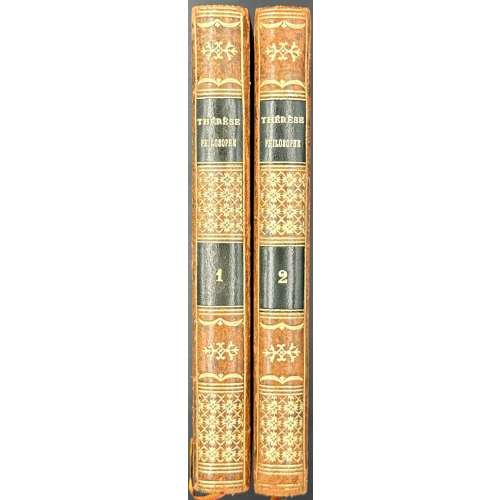 Two volumes, 168 x 106 mm each, uniformly bound in faux mottled calf ruled in gilt, marbled endpapers. Vol. 1: 3 blank leaves of wove paper, 3 blank leaves of laid paper, half-title/blank, blank/frontispiece, ‘engraved’ t.p./blank, both printed on laid paper watermarked “ARCHES A LA | MAIN”; ‘letterpress’ t.p.,/blank, pp.: [1] 2-115 [116 blank], 3 blank leaves of laid paper, 3 blank leaves of wove paper; collated 12mo: π2 A-I6 K4; total 60 leaves plus 16 ‘engraved’ plates, incl. t.p. and frontis. Vol. 2: 3 blank leaves of wove paper, 3 blank leaves of laid paper, half-title/blank, blank/frontispiece, ‘engraved’ t.p./blank, no watermark, ‘letterpress’ t.p.,/blank, pp.: 1-77 [78 blank], 2 blank leaves of laid paper, 3 blank leaves of wove paper; collated 12mo: π2 A-F6 G3; total 41 leaves plus 24 ‘engraved’ plates, incl. t.p. and frontis. Dutel (I): A-1089, p. 325: in-8 (probably by size only, no formula suggested), pagination 115 and 77 as here, 2 frontispieces, 2 engraved titles dated 1873, “et 36 belles gravures de Binet”. Cohen-DeRicci: p. 734 bottom: in-12, no pagination, no formula. "Thérèse" was offered by a French seller user-75d14f4 on the online auction platform CATAWIKI in December 2021. The seller's description of this two-volume set was: "Re-edition, the date of which I was unable to determine. (London, no name, 1782) 2 duodecimo volumes of 115 and 77 pp., very lovely marbled sheepskin pastiche bindings, gilded triple fillets, adorned spines, black title labels. This classic of 18th-century clandestine erotica was written in 1748 by an author who has remained anonymous, attributed at the time to Montigny, which led to his internment in the Bastille. It is now attributed to the Jean-Baptiste de Boyer, Marquis d'Argens. Edition illustrated with 37 very unrestrained figures, engraved in intaglio after Borel, unsigned." I should have paid more attention to the first phase, about the re-edition, but I didn't. After a few bidding rounds, I won the book when the hammer price was 2,200 Euros. On the 28th of December, 2021, I paid for this little beauty $2,760. The book arrived a few days later. The paper's quality and texture, the watermark, the absence of the platemark, and the lack of embossing on the back (text and plates) made me suspect it was a fake. The pages were absolutely flat to the touch! I established clear evidence of a high-resolution 'xerox' copy using Celestron Micro Capture Pro micro-photography. I wrote to the seller and the auction platform, explaining my doubts regarding its authenticity. To prove my point, I include a few micro photos of the "Thérèse" and some books printed at the end of the 18th century. I explained why I considered it a fake and requested a return/refund. After two months of email exchanges, the seller and the platform refused to pay me back. Today is the 2nd anniversary of the purchase. I still have the book. To celebrate my carelessness, I included it in my library to warn fellow book collectors about buying from an unknown dealer via certain online auction platforms. Ref.: Bamber Gascoigne. How to Identify Prints: A Complete Guide to Manual and Mechanical Processes from Woodcut to Ink. — Thames and Hudson, 1995.
Two volumes, 168 x 106 mm each, uniformly bound in faux mottled calf ruled in gilt, marbled endpapers. Vol. 1: 3 blank leaves of wove paper, 3 blank leaves of laid paper, half-title/blank, blank/frontispiece, ‘engraved’ t.p./blank, both printed on laid paper watermarked “ARCHES A LA | MAIN”; ‘letterpress’ t.p.,/blank, pp.: [1] 2-115 [116 blank], 3 blank leaves of laid paper, 3 blank leaves of wove paper; collated 12mo: π2 A-I6 K4; total 60 leaves plus 16 ‘engraved’ plates, incl. t.p. and frontis. Vol. 2: 3 blank leaves of wove paper, 3 blank leaves of laid paper, half-title/blank, blank/frontispiece, ‘engraved’ t.p./blank, no watermark, ‘letterpress’ t.p.,/blank, pp.: 1-77 [78 blank], 2 blank leaves of laid paper, 3 blank leaves of wove paper; collated 12mo: π2 A-F6 G3; total 41 leaves plus 24 ‘engraved’ plates, incl. t.p. and frontis. Dutel (I): A-1089, p. 325: in-8 (probably by size only, no formula suggested), pagination 115 and 77 as here, 2 frontispieces, 2 engraved titles dated 1873, “et 36 belles gravures de Binet”. Cohen-DeRicci: p. 734 bottom: in-12, no pagination, no formula. "Thérèse" was offered by a French seller user-75d14f4 on the online auction platform CATAWIKI in December 2021. The seller's description of this two-volume set was: "Re-edition, the date of which I was unable to determine. (London, no name, 1782) 2 duodecimo volumes of 115 and 77 pp., very lovely marbled sheepskin pastiche bindings, gilded triple fillets, adorned spines, black title labels. This classic of 18th-century clandestine erotica was written in 1748 by an author who has remained anonymous, attributed at the time to Montigny, which led to his internment in the Bastille. It is now attributed to the Jean-Baptiste de Boyer, Marquis d'Argens. Edition illustrated with 37 very unrestrained figures, engraved in intaglio after Borel, unsigned." I should have paid more attention to the first phase, about the re-edition, but I didn't. After a few bidding rounds, I won the book when the hammer price was 2,200 Euros. On the 28th of December, 2021, I paid for this little beauty $2,760. The book arrived a few days later. The paper's quality and texture, the watermark, the absence of the platemark, and the lack of embossing on the back (text and plates) made me suspect it was a fake. The pages were absolutely flat to the touch! I established clear evidence of a high-resolution 'xerox' copy using Celestron Micro Capture Pro micro-photography. I wrote to the seller and the auction platform, explaining my doubts regarding its authenticity. To prove my point, I include a few micro photos of the "Thérèse" and some books printed at the end of the 18th century. I explained why I considered it a fake and requested a return/refund. After two months of email exchanges, the seller and the platform refused to pay me back. Today is the 2nd anniversary of the purchase. I still have the book. To celebrate my carelessness, I included it in my library to warn fellow book collectors about buying from an unknown dealer via certain online auction platforms. Ref.: Bamber Gascoigne. How to Identify Prints: A Complete Guide to Manual and Mechanical Processes from Woodcut to Ink. — Thames and Hudson, 1995.
Books used for comparison: [LIB-2743.2021] Restif de la Bretonne. Les parisiennes, ou XL caractères généraux pris dans les mœurs actuelles, propres à servir à l’instruction des personnes-du-sexe / 4 vol. — Neufchâtel, et Paris: Guillot, 1787. [LIB-3027.2022] [Héliodore d’Emèse]. Amours de Théagènes et Chariclée: Histoire Éthiopique / 2 vol. — Londres [i.e. Paris]: [s.n.], 1743. [LIB-3252.2023] [Nicolas Chorier.] Le Meursius françois, ou entretiens galans d’Aloysia, orné de figures. — Cythere [i.e. Paris: Cazin], 1782. Below is a Xerox copy for comparison.Thérèse philosophe, 1783.
Late 18th century books
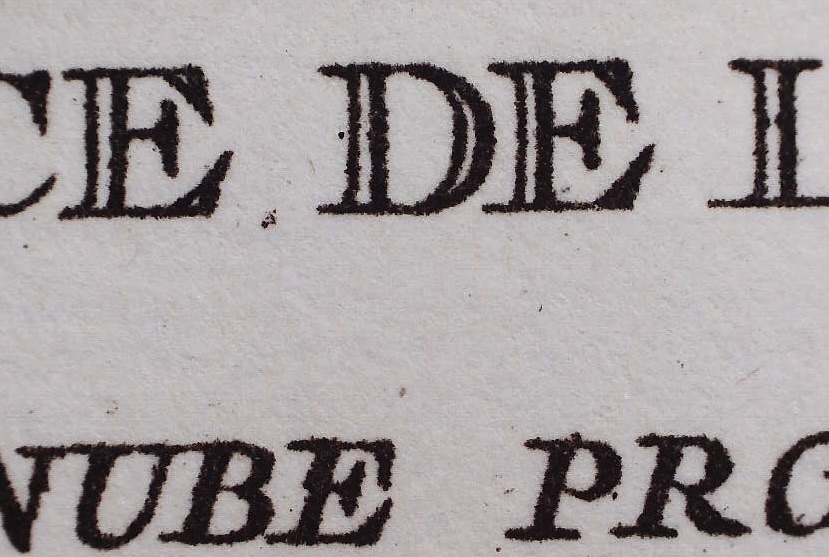
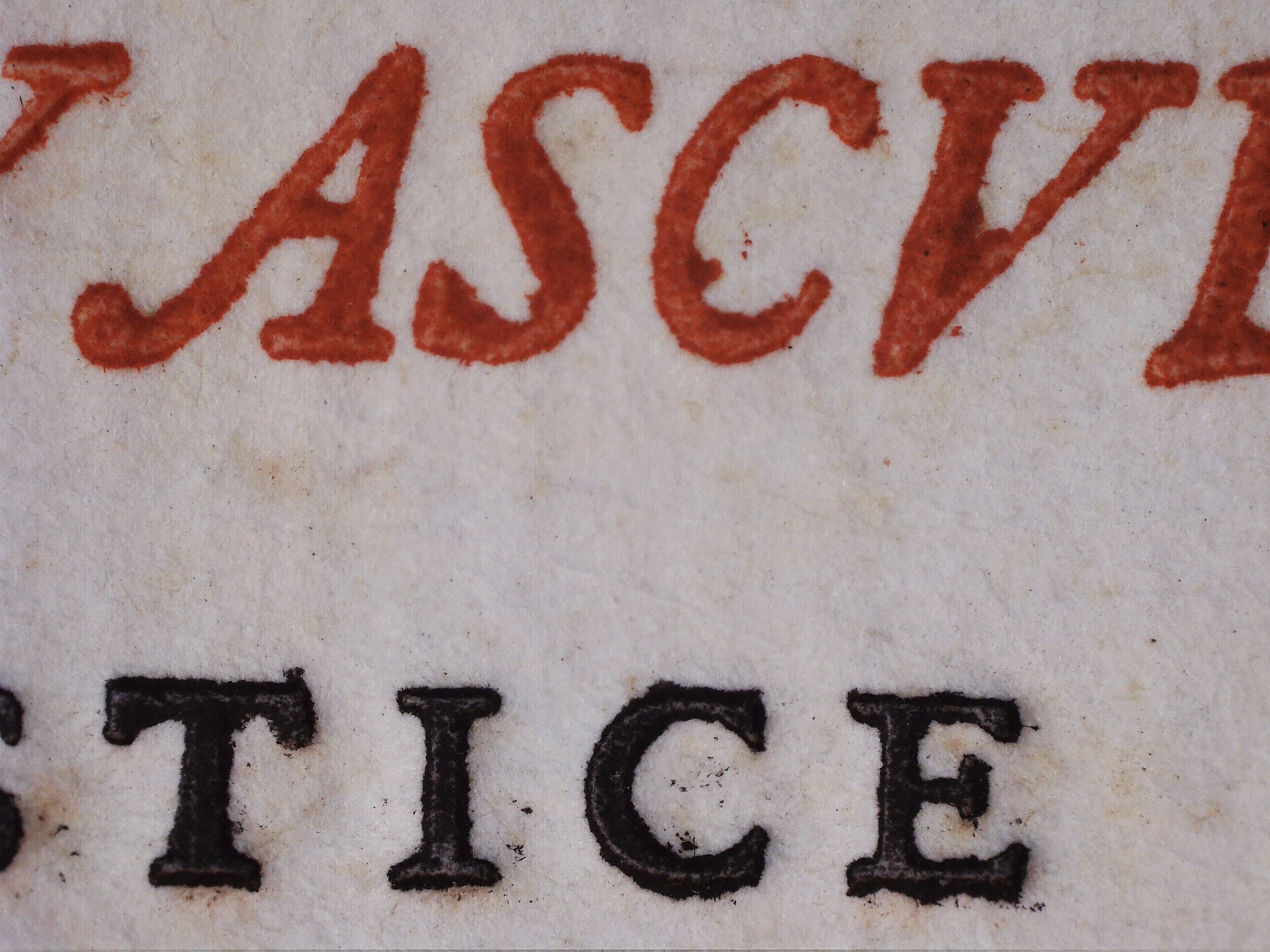
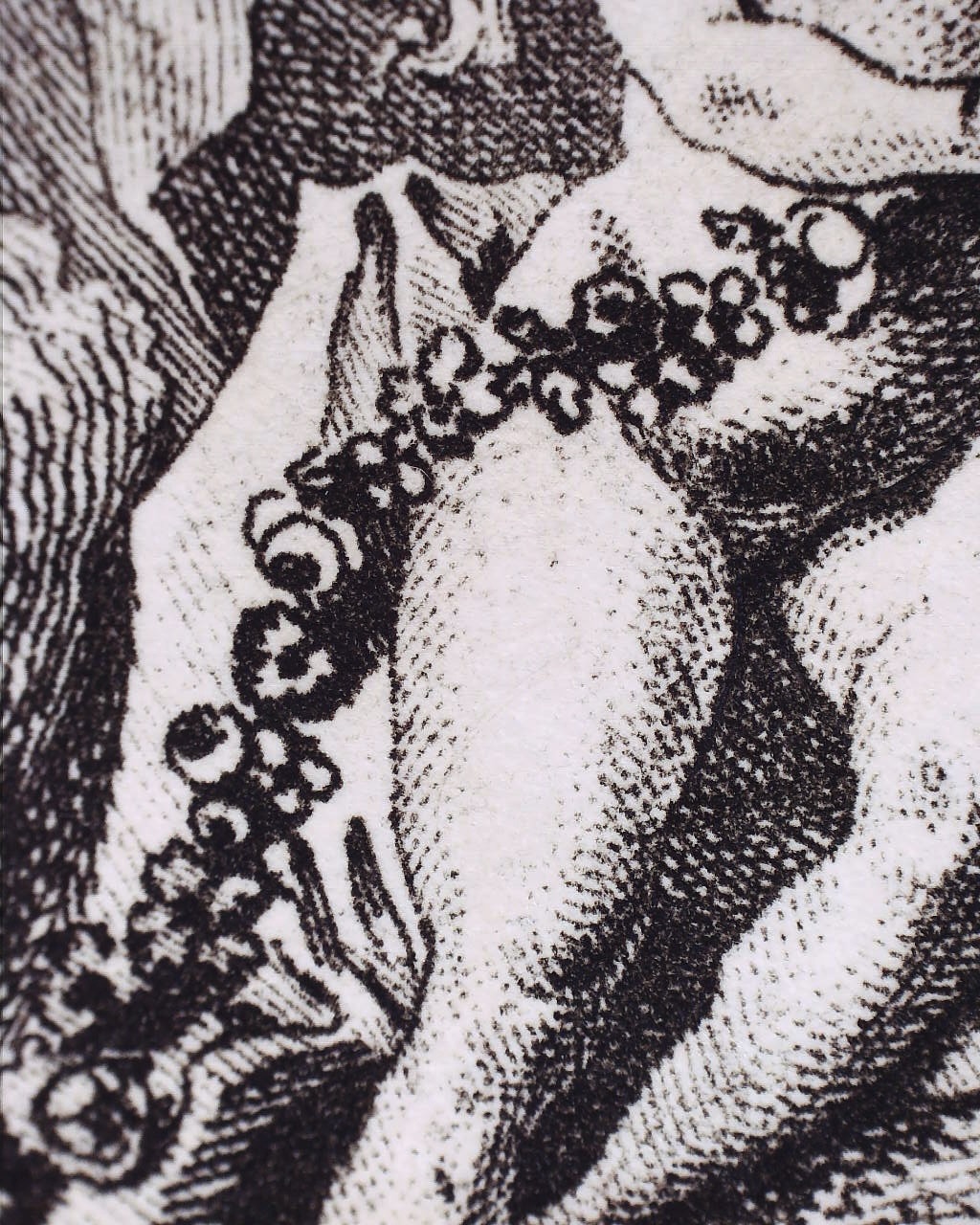
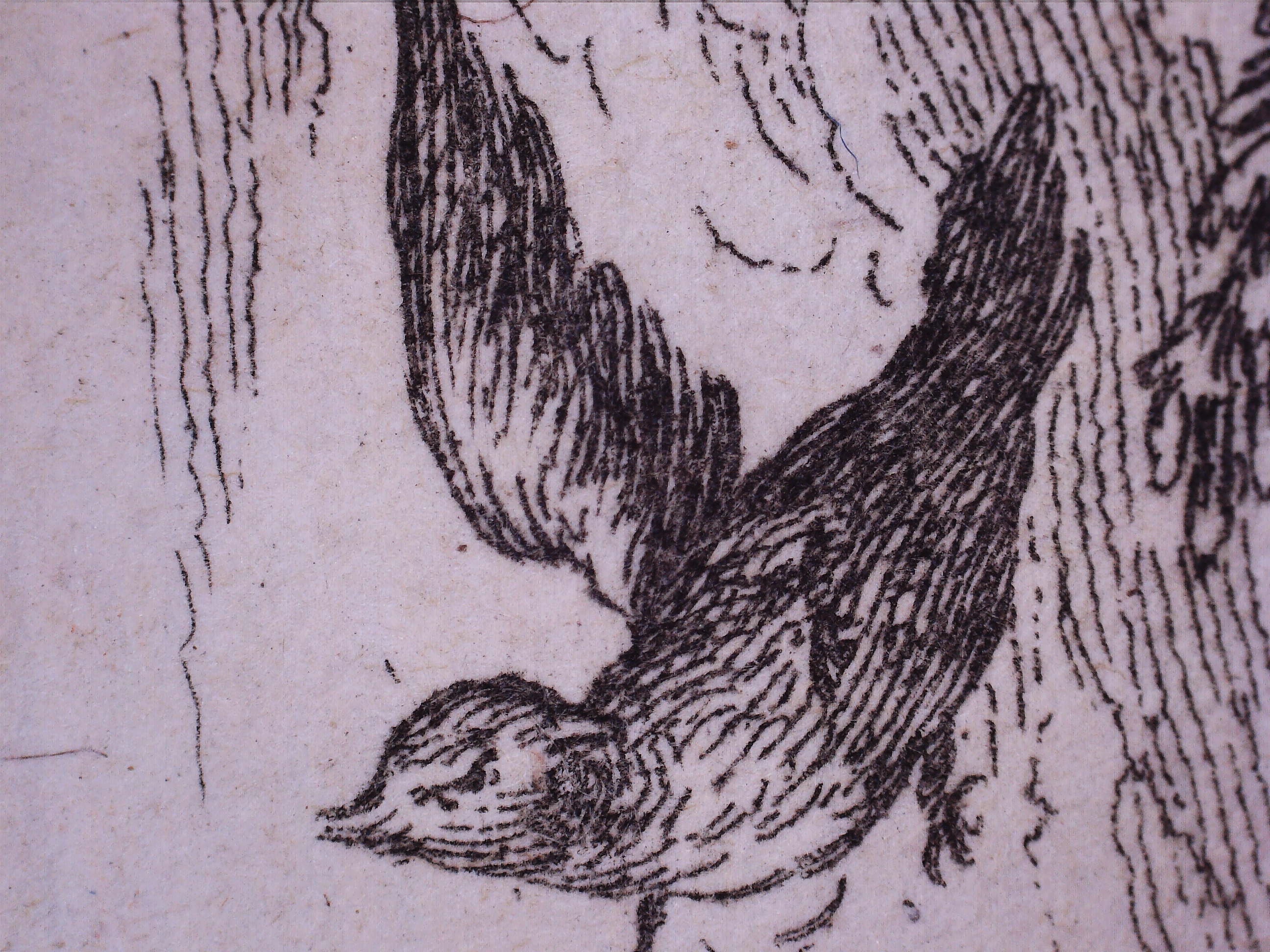
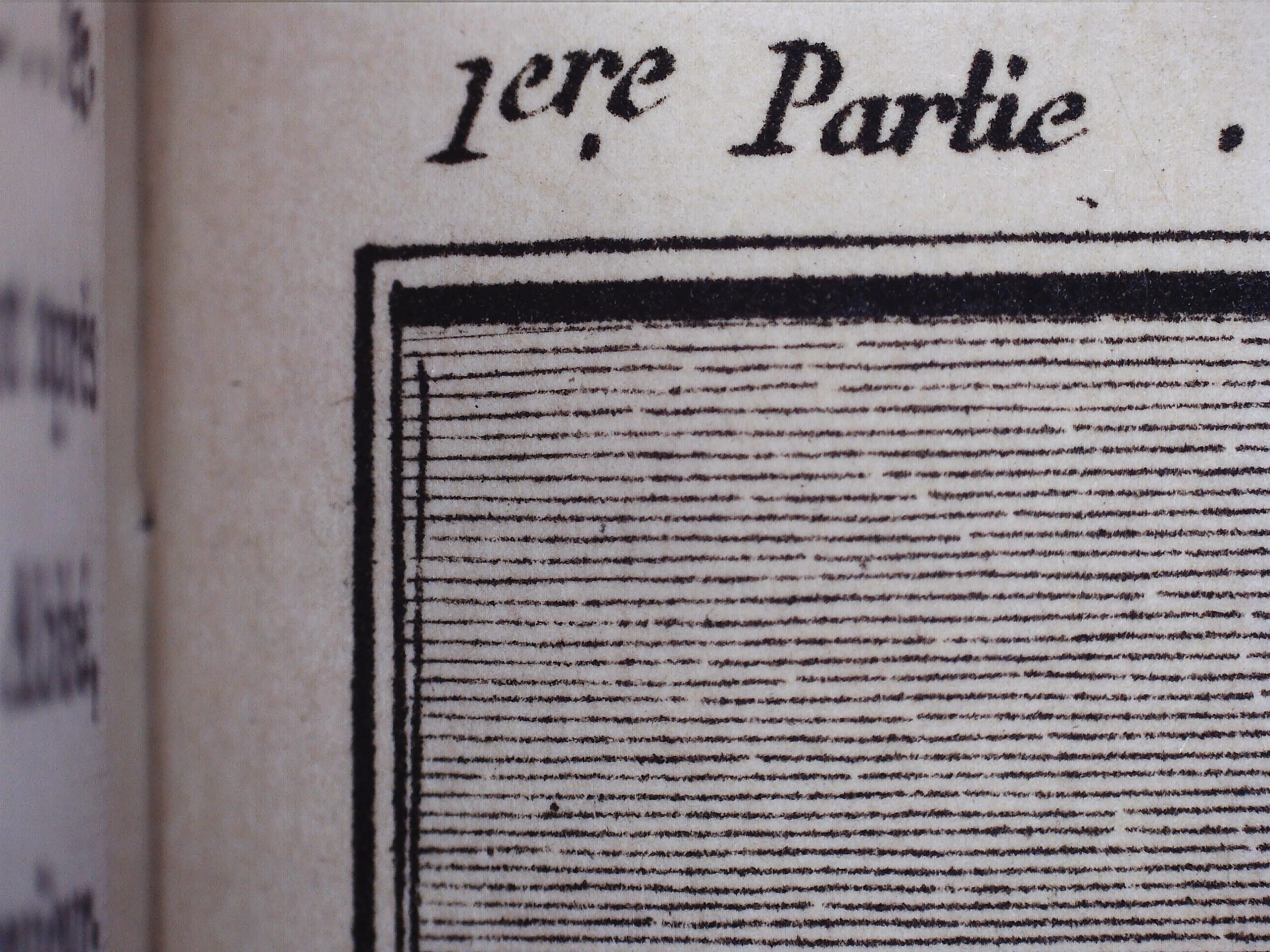
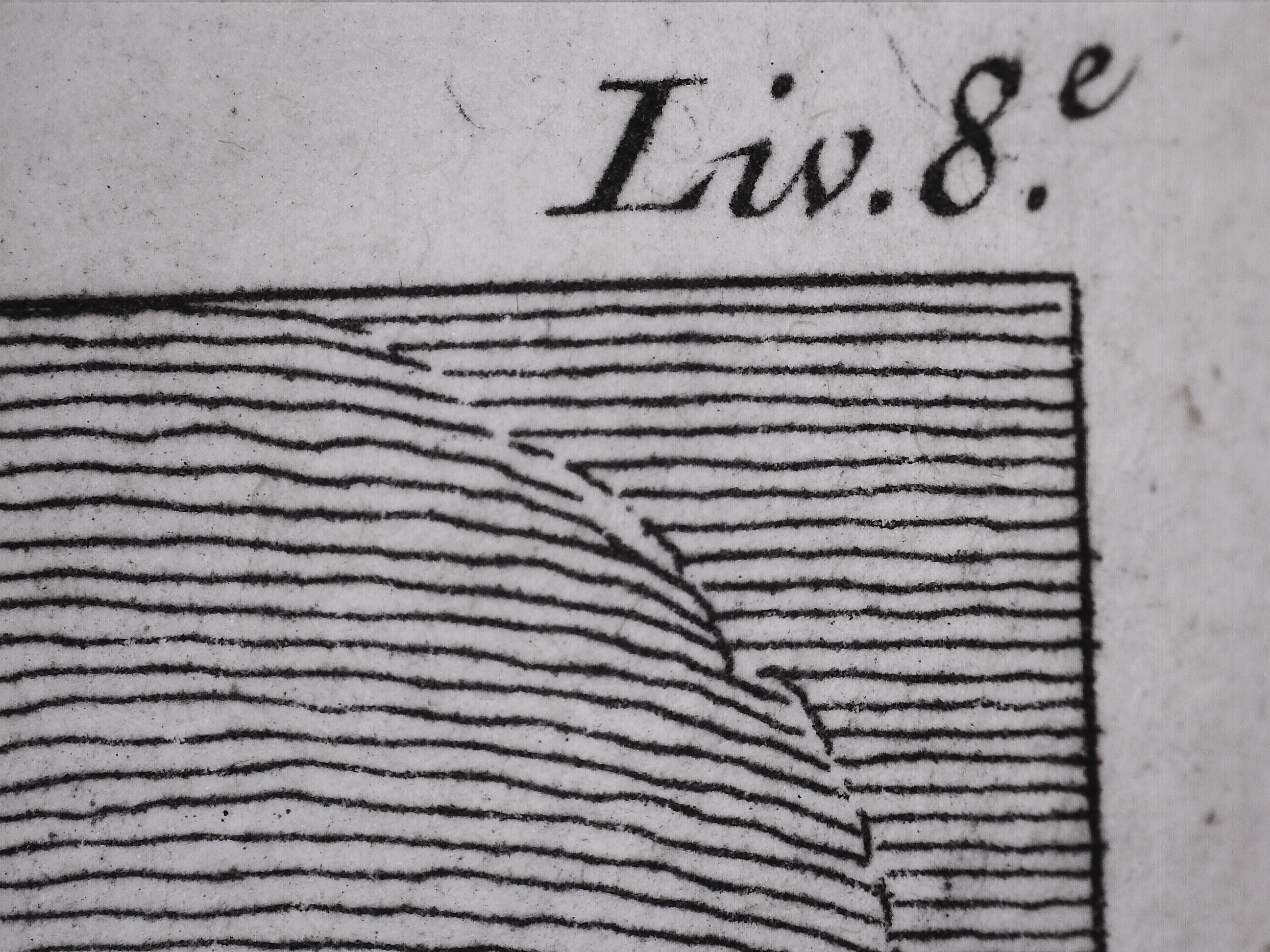
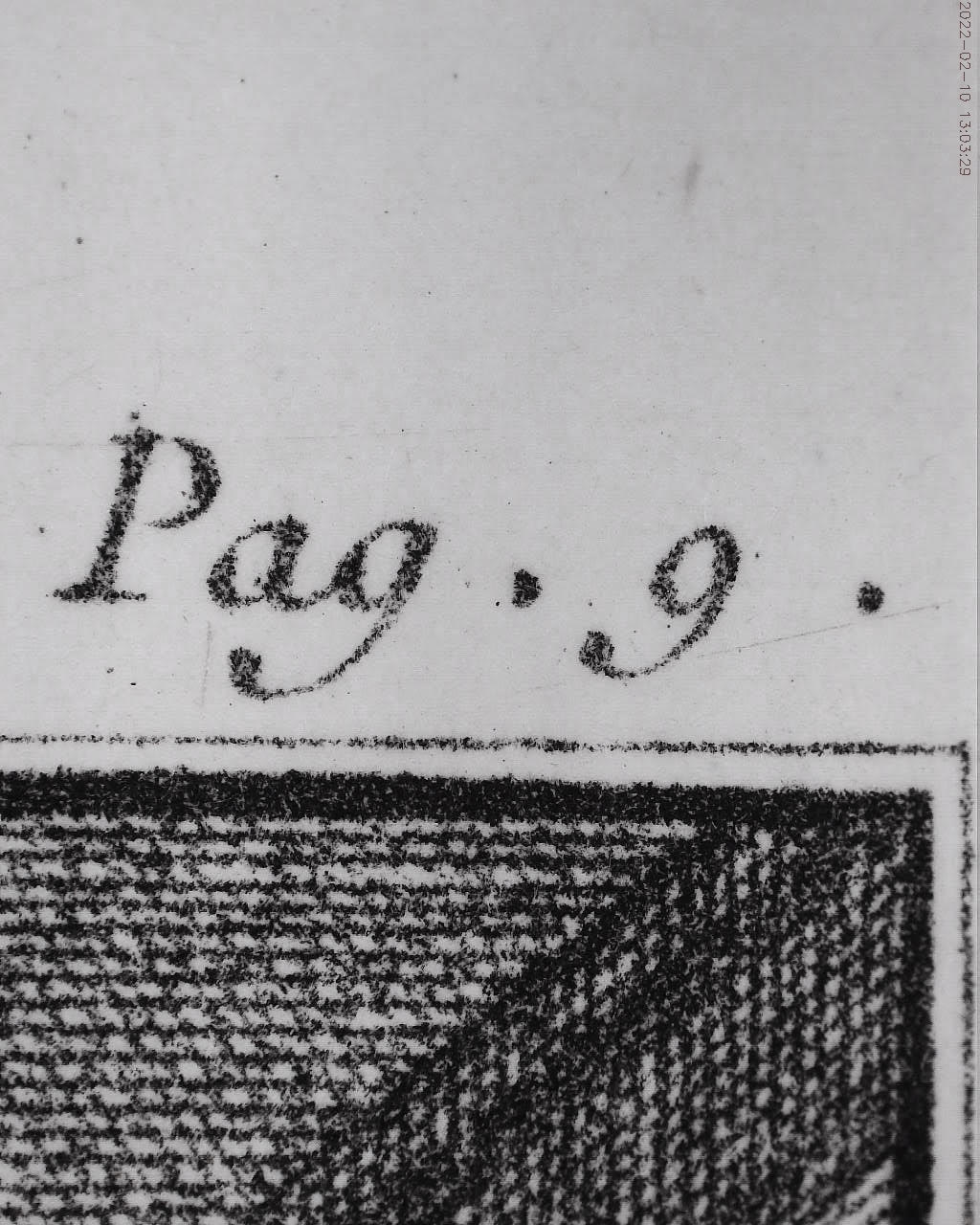
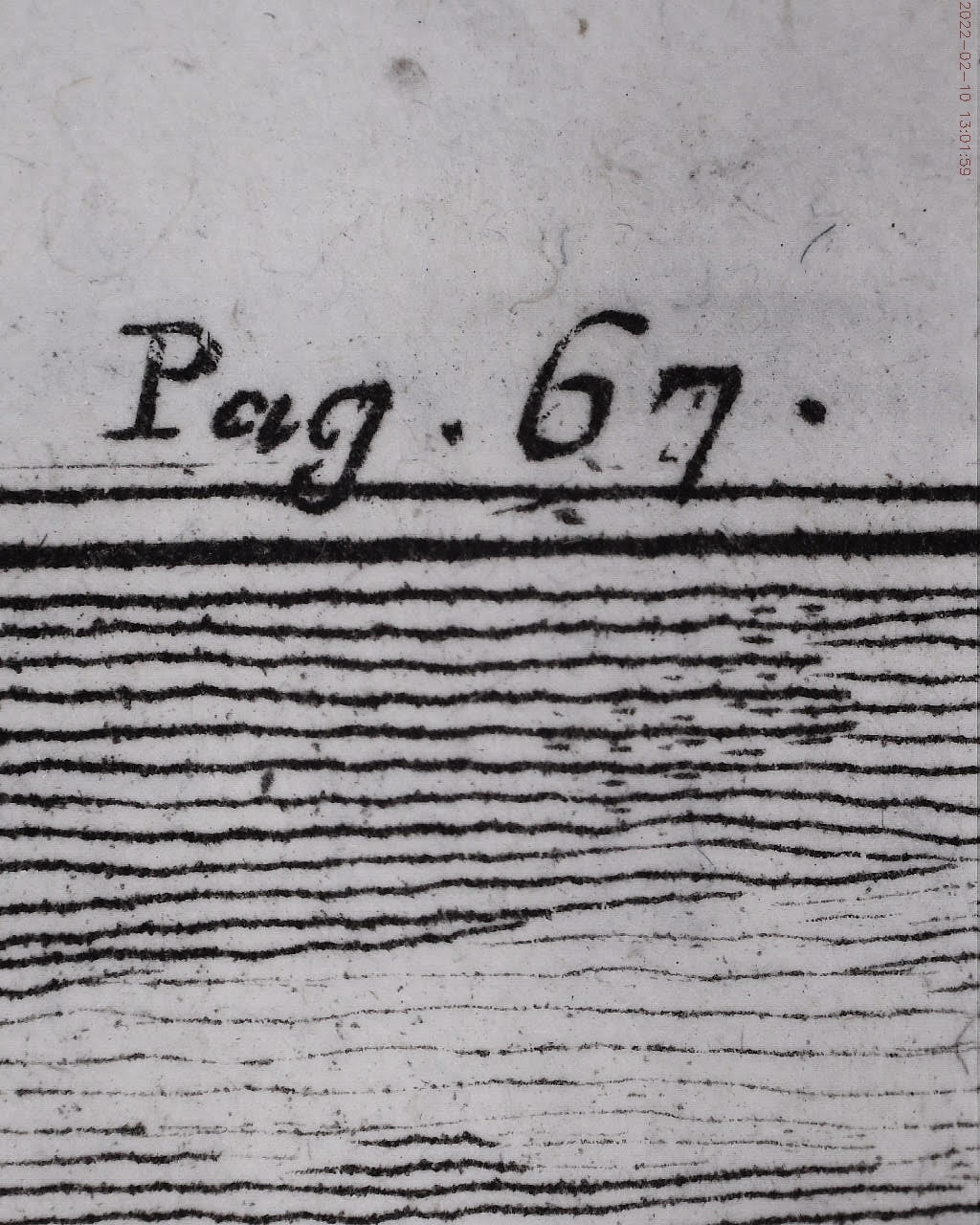

-
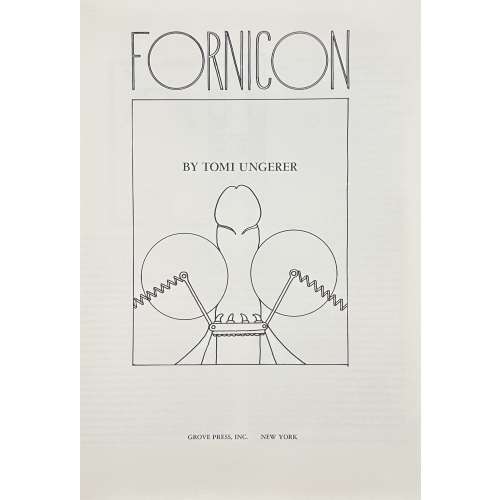 Hardcover, 333 x 247 mm, black cloth with gilt facsimile to front board and gilt lettering to spine, aubergine dust jacket with white lettering and red facsimile over black panel to front and back, crimson endpapers, laid paper, unpaginated; pp.: [4] h.t./blank, t.p./imprint, [2] text by John Hollander, 61 leaves of plates; originally published in 1969 by Rhinoceros Press, New York, as a limited-edition portfolio with slipcase. Title-page: Fornicon | (in frame) BY TOMI UNGERER | GROVE PRESS NEW YORK || Jean-Thomas [Tomi] Ungerer (French,1931 – 2019) John Hollander (American, 1929 – 2013)
Hardcover, 333 x 247 mm, black cloth with gilt facsimile to front board and gilt lettering to spine, aubergine dust jacket with white lettering and red facsimile over black panel to front and back, crimson endpapers, laid paper, unpaginated; pp.: [4] h.t./blank, t.p./imprint, [2] text by John Hollander, 61 leaves of plates; originally published in 1969 by Rhinoceros Press, New York, as a limited-edition portfolio with slipcase. Title-page: Fornicon | (in frame) BY TOMI UNGERER | GROVE PRESS NEW YORK || Jean-Thomas [Tomi] Ungerer (French,1931 – 2019) John Hollander (American, 1929 – 2013) -
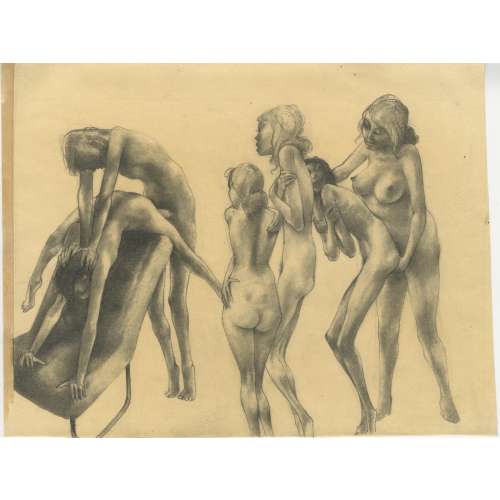 Graphite on wove paper, 217 x 284 mm, black ink stamp to verso: “Prof O. R. Schatz | Wien II, Gr. Mohreng 3b | Tel.: 55 82 566”. Unsigned, attributed to Otto Rudolf Schatz (Austrian, 1900 – 1961).
Graphite on wove paper, 217 x 284 mm, black ink stamp to verso: “Prof O. R. Schatz | Wien II, Gr. Mohreng 3b | Tel.: 55 82 566”. Unsigned, attributed to Otto Rudolf Schatz (Austrian, 1900 – 1961). -
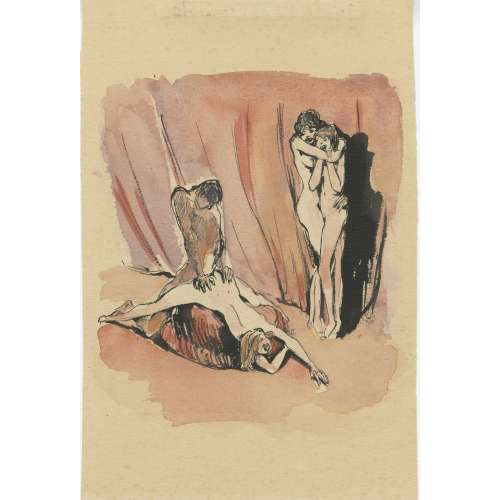 Watercolour on wove paper, 243 x 161 mm, black ink stamp to verso: “Nachlaß O R SCHATS”. Attributed to Otto Rudolf Schatz (Austrian, 1900 – 1961).
Watercolour on wove paper, 243 x 161 mm, black ink stamp to verso: “Nachlaß O R SCHATS”. Attributed to Otto Rudolf Schatz (Austrian, 1900 – 1961). -
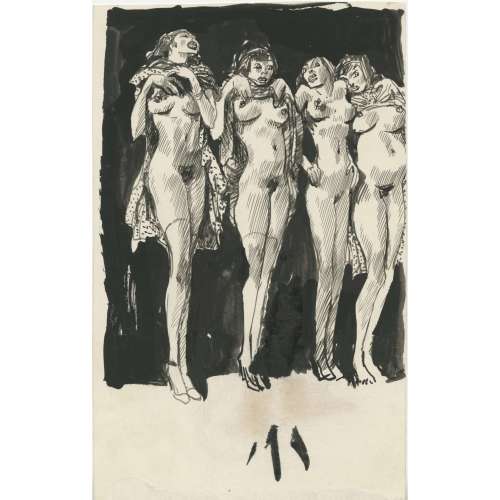 Drawing on both sides; Pen and wash, india ink, gouache, on cardboard, 225 x 140 mm, black ink stamp to verso: “Nachlaß O R SCHATS”, remnants of hinges. Attributed to Otto Rudolf Schatz (Austrian, 1900 – 1961).
Drawing on both sides; Pen and wash, india ink, gouache, on cardboard, 225 x 140 mm, black ink stamp to verso: “Nachlaß O R SCHATS”, remnants of hinges. Attributed to Otto Rudolf Schatz (Austrian, 1900 – 1961). -
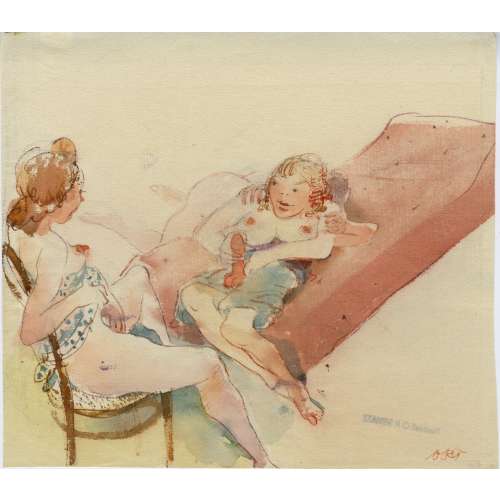 Watercolour on laid paper, 198 x 225 mm, signed or stamped in orange ink “ORS” to recto [Otto Rudolf Schatz (Austrian, 1900 – 1961)]; black ink stamp: “Nachlaß O R SCHATS”, pencil “ss” in the bottom left corner, and remnants of a hinge on the upper right to verso.
Watercolour on laid paper, 198 x 225 mm, signed or stamped in orange ink “ORS” to recto [Otto Rudolf Schatz (Austrian, 1900 – 1961)]; black ink stamp: “Nachlaß O R SCHATS”, pencil “ss” in the bottom left corner, and remnants of a hinge on the upper right to verso. -
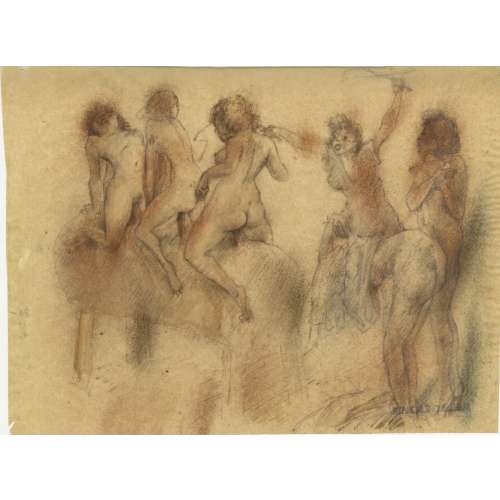 Pencil, pen and ink wash on india paper, 170 x 228 mm, black ink stamp to verso: “Nachlaß O R SCHATS”. Unsigned, attributed to Otto Rudolf Schatz (Austrian, 1900 – 1961).
Pencil, pen and ink wash on india paper, 170 x 228 mm, black ink stamp to verso: “Nachlaß O R SCHATS”. Unsigned, attributed to Otto Rudolf Schatz (Austrian, 1900 – 1961). -
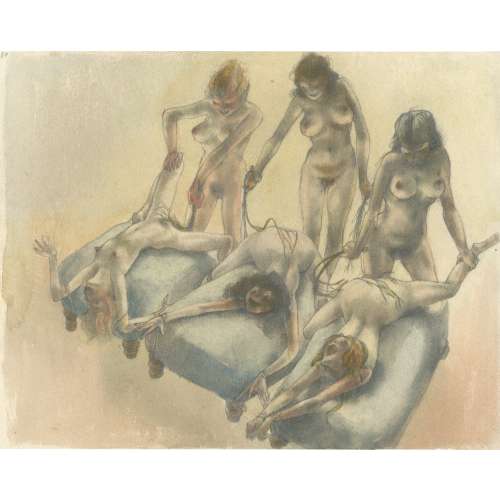 Watercolour on laid paper watermarked “HOLLAND”, 255 x 324 mm, number “10” ms pencil in the upper left corner, remnants of hinges to verso; unsigned. Attributed to Otto Rudolf Schatz (Austrian, 1900 – 1961).
Watercolour on laid paper watermarked “HOLLAND”, 255 x 324 mm, number “10” ms pencil in the upper left corner, remnants of hinges to verso; unsigned. Attributed to Otto Rudolf Schatz (Austrian, 1900 – 1961). -
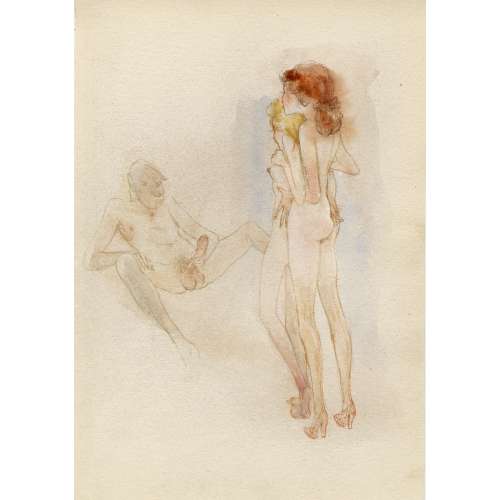 Watercolour on thick wove paper, unsigned. Attributed to Otto Rudolf Schatz (Austrian, 1900 – 1961). Size: 305 x 212 mm.
Watercolour on thick wove paper, unsigned. Attributed to Otto Rudolf Schatz (Austrian, 1900 – 1961). Size: 305 x 212 mm. -
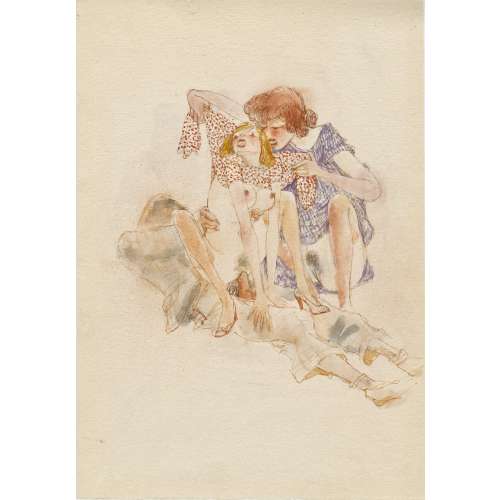 Watercolour on thick wove paper, unsigned. Attributed to Otto Rudolf Schatz (Austrian, 1900 – 1961). Size: 305 x 212 mm.
Watercolour on thick wove paper, unsigned. Attributed to Otto Rudolf Schatz (Austrian, 1900 – 1961). Size: 305 x 212 mm. -
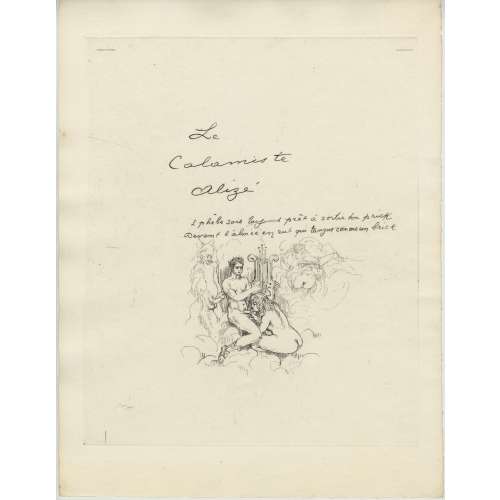 Thirteen unnumbered loose leaves 323 x 249 mm, watermarked BFK Rives, with manuscript text and vignettes produced by etching or, more likely, drypoint (see microphoto), incl. title-page, one full-page illustration and two leaves of text only; versos blank. Some leaves have registration marks. The set is housed in a cream French flapped folder (chemise) without lettering; the seller’s description is pasted to the front cover verso, glassine dust cover. Seller’s description: Cette édition in-folio du recueil de poèmes de Louis de Gonzague Frick, inconnue de Jean-Pierre Dutel, qui « a été tirée à 50 exemplaires (...) est certainement la plus rare (et a été) publiée après 1940 sur vélin (BFK) Rives » (cf. Ader, 3 mars 2020, n°155). Exemplaire « de passe », sans justificatif, complet des 13 planches avec 11 eaux-fortes, dont une à pleine page, d'Auguste Brouet. Ref.: According to honesterotica, the first edition was published in 1938 in 65 copies: "The pink Ingres paper and the loose-leaf format tied with a red ribbon". Another source states: "Le tirage a été effectué avec marges, sur papier vélin BFK Rives au format in-4 (32,5 × 25), les planches mesurant 26,5 × 22 cm. Certains exemplaires sont sur papier blanc - Je remercie le libraire qui a pris la peine de me communiquer ces dernières informations. Pour moi, c'est bien l'édition à 65 qui est l'originale, les deux autres étant des retirages légèrement postérieurs, mais dans le détail desquels le principe de l’œuvre - un manuscrit destiné à quelques amis de l'auteur - a été quelque peu trahi." Contributors: Louis de Gonzague Frick (French, 1883 – 1958) Auguste Brouet (French, 1872 – 1941)
Thirteen unnumbered loose leaves 323 x 249 mm, watermarked BFK Rives, with manuscript text and vignettes produced by etching or, more likely, drypoint (see microphoto), incl. title-page, one full-page illustration and two leaves of text only; versos blank. Some leaves have registration marks. The set is housed in a cream French flapped folder (chemise) without lettering; the seller’s description is pasted to the front cover verso, glassine dust cover. Seller’s description: Cette édition in-folio du recueil de poèmes de Louis de Gonzague Frick, inconnue de Jean-Pierre Dutel, qui « a été tirée à 50 exemplaires (...) est certainement la plus rare (et a été) publiée après 1940 sur vélin (BFK) Rives » (cf. Ader, 3 mars 2020, n°155). Exemplaire « de passe », sans justificatif, complet des 13 planches avec 11 eaux-fortes, dont une à pleine page, d'Auguste Brouet. Ref.: According to honesterotica, the first edition was published in 1938 in 65 copies: "The pink Ingres paper and the loose-leaf format tied with a red ribbon". Another source states: "Le tirage a été effectué avec marges, sur papier vélin BFK Rives au format in-4 (32,5 × 25), les planches mesurant 26,5 × 22 cm. Certains exemplaires sont sur papier blanc - Je remercie le libraire qui a pris la peine de me communiquer ces dernières informations. Pour moi, c'est bien l'édition à 65 qui est l'originale, les deux autres étant des retirages légèrement postérieurs, mais dans le détail desquels le principe de l’œuvre - un manuscrit destiné à quelques amis de l'auteur - a été quelque peu trahi." Contributors: Louis de Gonzague Frick (French, 1883 – 1958) Auguste Brouet (French, 1872 – 1941)


